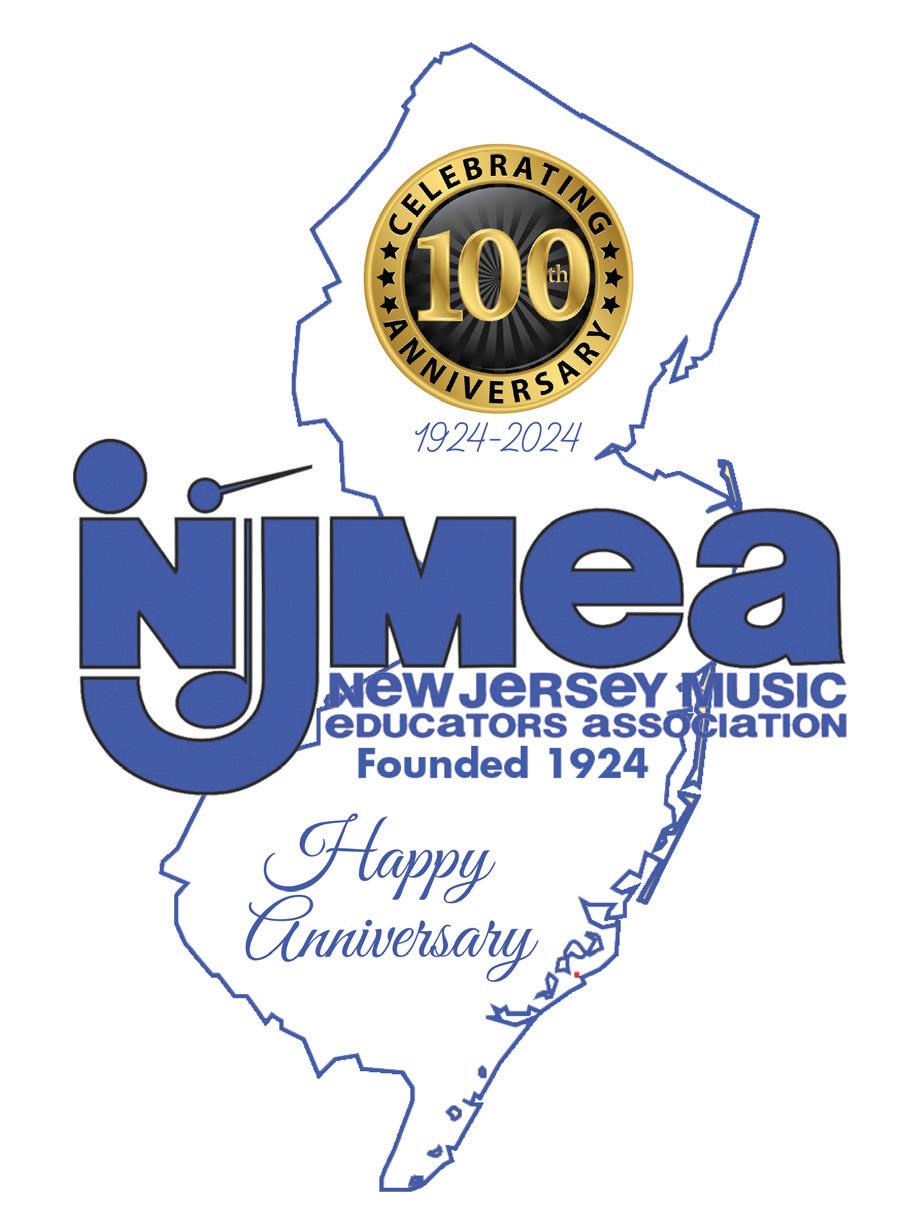


TEMPO

Greetings, Colleagues!




TEMPO

Greetings, Colleagues!
David Westawski
West Windsor Plainsboro High School - South westawski.njmea[at]gmail.com
My dad taught high school Spanish for 33 years. He continues to tell me to savor and enjoy the school year because the older you get, the quicker time flies. I’m certainly feeling that now as we somehow have made it to March. It feels as if we just started the school year, and now there are less than four months of it remaining.
At a recent faculty meeting, my principal asked us to take a look at any class roster and to make a list of the students with whom we had a real connection, beyond the course content area. We were then asked to identify the students with whom we knew little. Almost all of us were surprised to be staring at one or two names that fit that latter description. Those students are the ones who do well and don’t cause any trouble, but they lie just below our radars. We were challenged to identify those students in each of our classes and work to create a stronger relationship with each of them before the end of the school year.
This activity challenged my thinking: Do we actually spend time savoring and enjoying the work we do? Do we consistently tell others, especially our students, that we appreciate each of them and are proud of them? Do we allow ourselves to take our feet off the gas long enough to create meaningful connections and relationships with everyone in our circles? So much of the year is filled with benchmarks, performance preparation, or the next “big thing” that it’s easy to lose sight of the truly important elements of our lives and our teaching. People matter. I’d go so far as to say that people matter more than our content areas. When we put people first, everything else tends to fall right into place. Acknowledging and celebrating the many volunteers that allow NJMEA to function has become a top priority of mine.
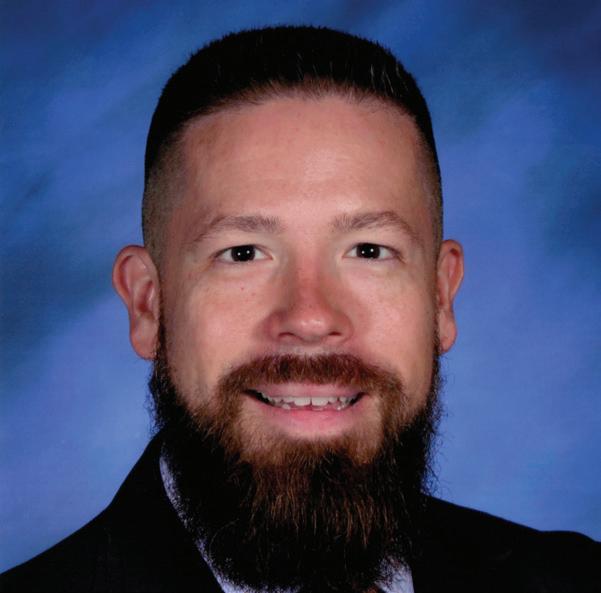
Last month, NJMEA celebrated its 100th anniversary at our annual conference. This year, registrations were up, exhibitors were up, and session submissions were up. Even membership in our association is up: As of November 30th, we had an increase of 519 members year over year. We’re proud of the work we do in conjunction with NAfME and are pleased that over 2,200 music educators in New Jersey find value in that work. There are many amazing events and people to celebrate as part of the NJMEA 2024 Conference.
First and foremost, I’d like to thank Marie Malara, our Conference Chairperson, for the tireless work she accomplished with her team. This was the first year I saw “how the sausage is made” and was continually amazed at the amount of time and effort that she put into planning a conference as large and comprehensive as ours. Marie is a consummate professional and has solutions to problems before the rest of us even know about them. There were many times I started to write an email or text with, “Hey! What about…” but before I could finish it there was an email in my inbox or text already addressing those concerns and thoughts with additional ideas and details. NJMEA is incredibly fortunate to have someone as wise, calm, and knowledgeable as Marie Malara on its Board.
Our February All-State and Honors Ensembles performed exceptionally under the direction of Dr. Bryan Powell (Modern Band), Dr. Amy Voorhees (Treble Choir), Dr. Peter Boonshaft (Wind Ensemble), and Dr. Joe Higgins (Symphonic Band). We’re so grateful that these world-class conductors were able to work with and inspire the talented student musicians of New Jersey!
A special thanks also goes to our Production Management Chair, Joe Cantaffa, for once again working to create a professional and highly organized experience for our students and conductors. Joe was thrown a huge curveball two weeks before the conference when the Treble Choir needed to relocate to the Claridge Hotel. As usual, he and his team hit it out of the park and allowed our students and chaperones to have a tremendous All-State weekend.
I also would like to thank our Band Performance Chair, Patrick O’Keefe, Choir Performance Chair, Brian Williams, and Emerging Ensembles Chair, Zach Gates, and all of the members of their dedicated committees for their hard work in creating another successful AllState and Honors experience. Serving as a performance chair requires an incredible amount of time and effort, especially as the performance season approaches. These chairs have performed their duties admirably while teaching full-time.
Lastly, and certainly not least, I extend my heartfelt thanks to our Executive Director, Bill McDevitt. He truly is the glue that holds all of this together. The number of pots he has on the stove at one time would make others run away screaming. He does all of this with a smile
on his face while never showing all that stress. None of us would be able to do our parts without Bill’s wisdom, institutional knowledge, and attention to detail. We are extremely fortunate to have such a seasoned music educator in that role.
Our association is stronger because of all of the volunteers listed above, the presenters, and all those who helped in any other capacity. You all gave so freely of your time and expertise in service to the music teachers and students of New Jersey.
As we rush toward spring break, I hope you have time to savor and enjoy your work, your families, all of the students in your classroom, and all the people in your life. Make sure they know how you feel about them as you continue to cultivate positive relationships with everyone you cross paths. Thank you for the wonderful work you do each day and for supporting and guiding the next generation of musicians. Know that I appreciate each one of you for all you do for your students, our association, and our profession.
Sincerely,

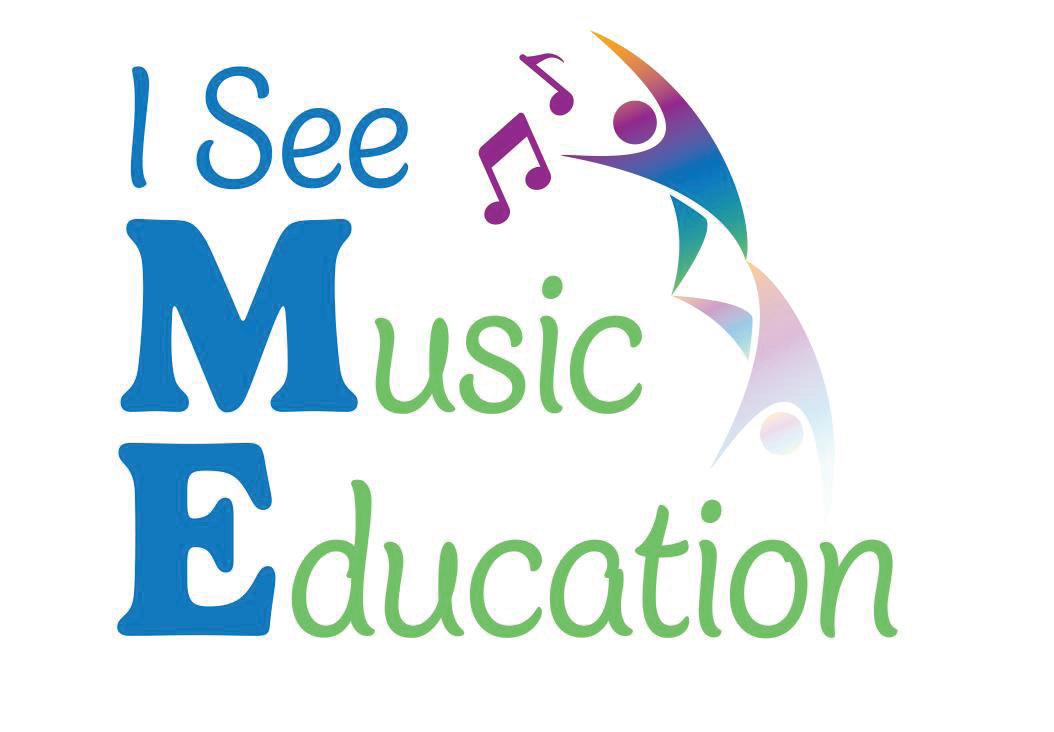

The Department of Music is the center of the musical arts at Kean University. Students seeking to explore the depth and breadth of music practice and culture can pursue professional paths in performance and education.
Accredited by the National Association of Schools of Music, Kean University’s Department of Music has a strong reputation for professional preparation and directing graduates toward successful careers.
DEGREES OFFERED
• Music (B.A.)
• Music Education (B.M.)
• Music Performance with an Emphasis in Pedagogy (B.M.)
PERFORMANCE OPPORTUNITIES
• Concert Choir and Chorale
• Symphonic Wind Ensemble and Chamber Winds
• Kean-NJIO Orchestra
• Guitar Orchestra
• Jazz Ensemble
• Percussion Ensemble
• Flute Ensemble
• Chamber Music
UPCOMING AUDITION DATES
March 20 • April 17 • May 22
All auditions are 3:30 – 5:30 p.m.
Additional dates are available by appointment. Contact music@kean.edu.


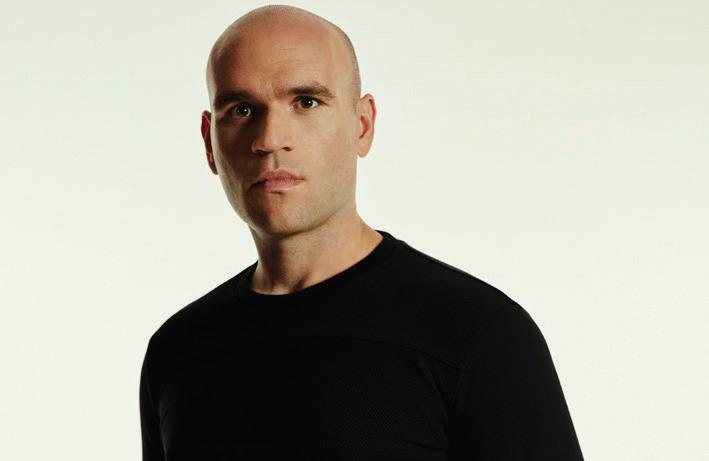
AT MONTCLAIR STATE UNIVERSITY


Performance
Music Education Composition
Music Therapy
Jazz Studies
NEW: Recording Arts + Production
An exceptional artistic and academic education

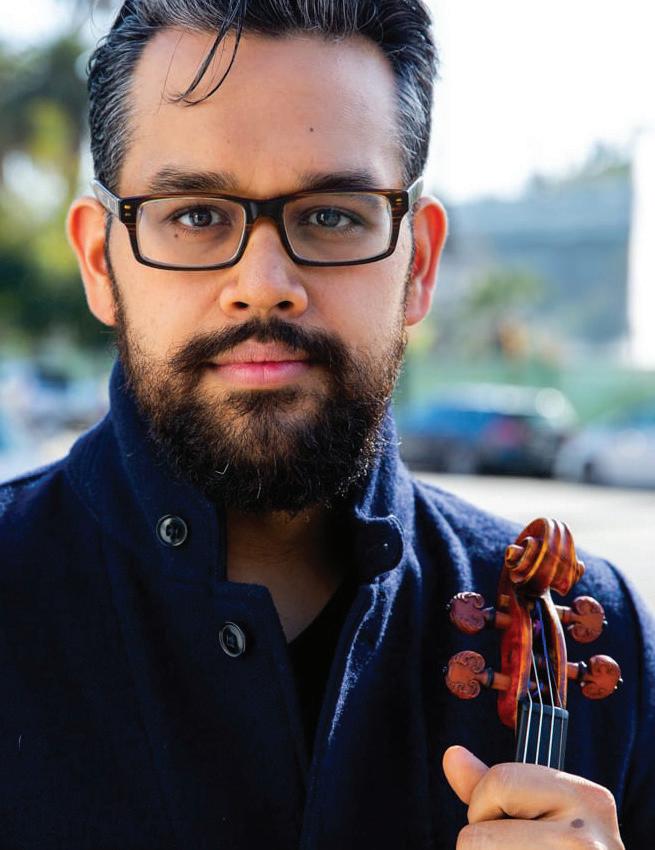
Join us for our third annual re-imagined professional residency program at the John J. Cali School of Music. The week-long residencies include a rotation of seven toprated artists and ensembles. Each residency will contribute to an ongoing exploration of the ever-changing landscape of music today, introducing students to a future that will be, at times, less traditional. Through the multiple opportunities to learn and collaborate with guest artists, Cali students will broaden their understanding of their future musical careers. TIME FOR THREE

Mentorship by internationally acclaimed artists, educators, and scholars
Inspiration and preparation to serve the community and enrich society using the transformative power of music
Developing musicianship and professional skills in ensembles, masterclasses, clinical experiences, internships, and teaching
Experiencing the cultural riches of New York City nearby
Bachelor of Music, Bachelor of Arts, Master of Music, Master of Arts, Artist’s Diploma
Music Education, Performance, Jazz Studies, Music Therapy, Theory/Composition
Graduate String Quartet Residency Program
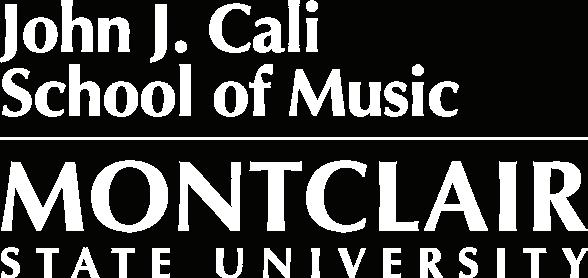
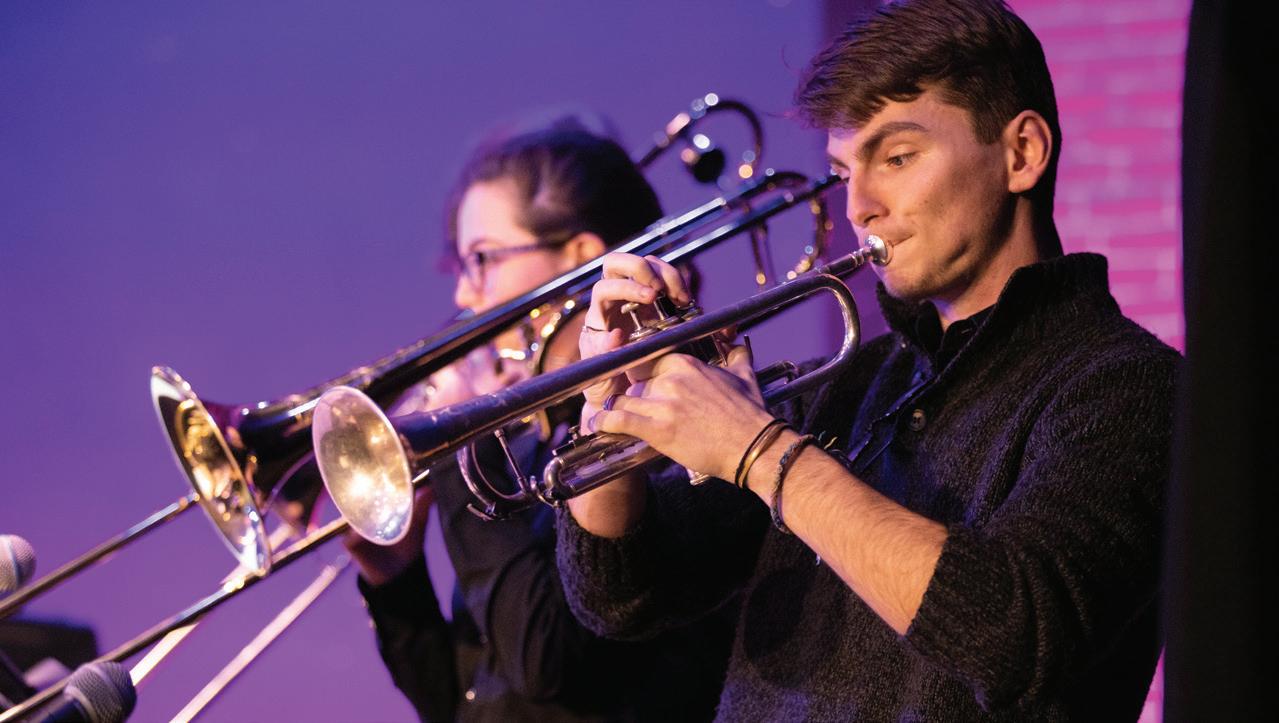
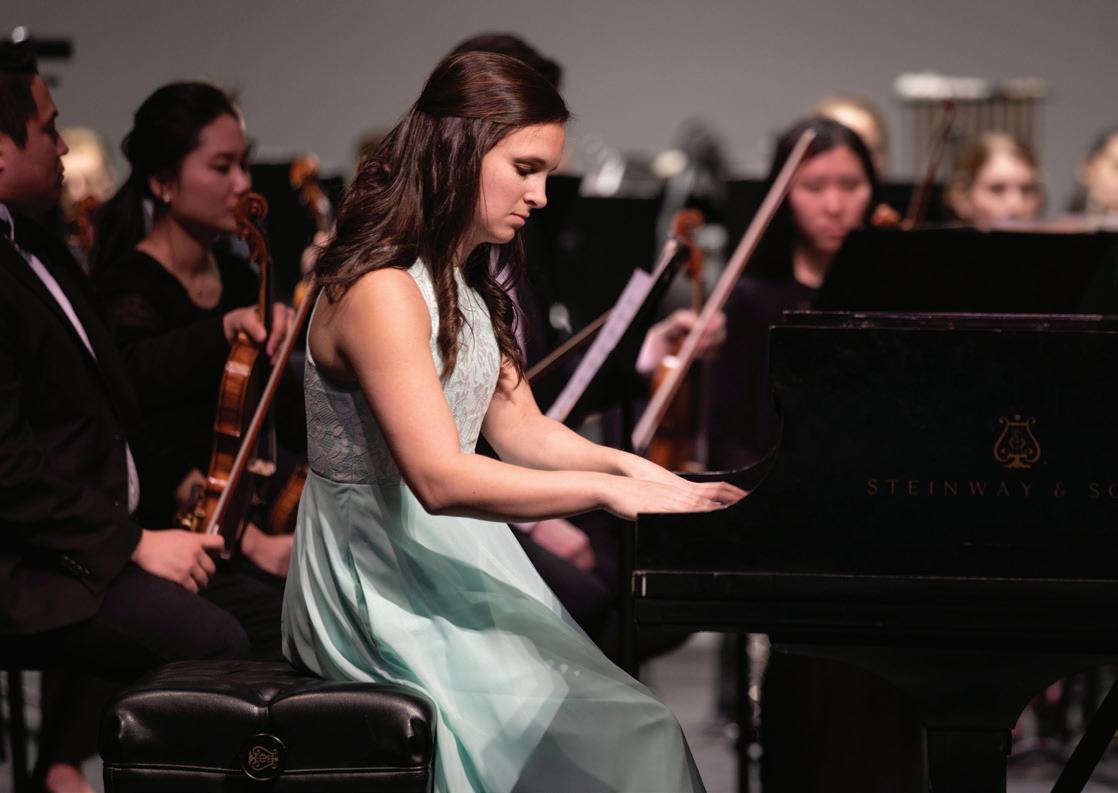

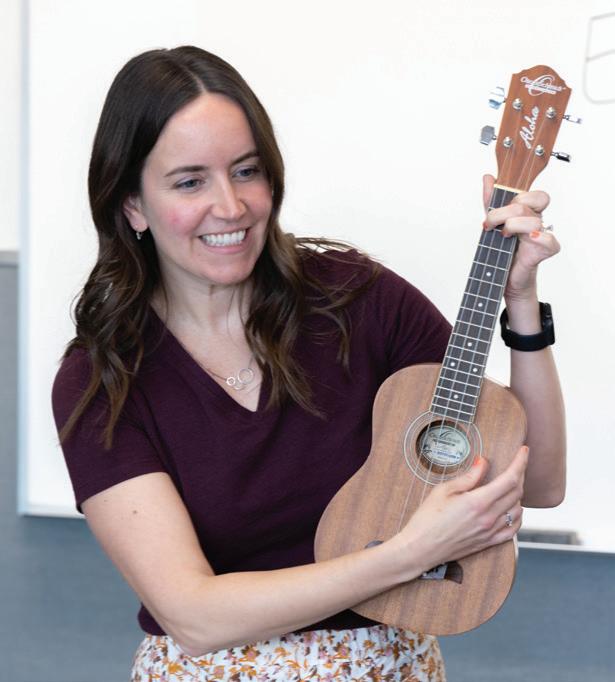



> Create your future in music education.
> Study cutting-edge pedagogical practices.
> Explore new technologies and contemporary perspectives.
• Bachelor of Music in Music Education
Teacher licensure program (PK–12, music)
Observe, assist, and teach in partner schools. Teach preschoolers in our KidsJam community music program.


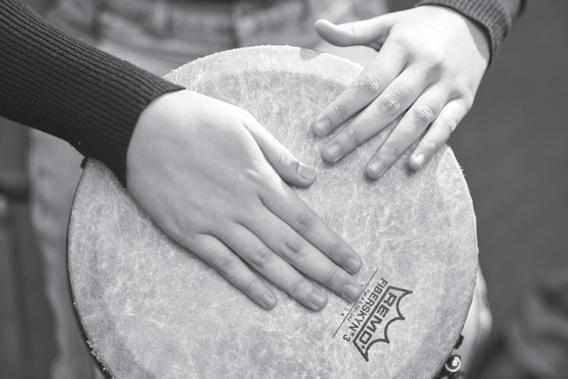
> Learn from world-class arts educators.
> Apply innovative and relevant strategies to teach the students of today and tomorrow.
> Teach while you learn.
• Master of Music in Music Education
• Master of Music in Music Education (Autism Concentration)
• Graduate Certificate in Music Education and Autism
Distinctive programs that advance the art of teaching music
Unique autism concentration programs that prepare you to reach all learners
Offerings that bridge pedagogical theory and practice
Flexible schedule (summer, evenings, independent instruction)
Observe, assist, and teach in partner schools. Teach music to students with disabilities at the Berklee Institute for Accessible Arts Education.
Visit a class, meet faculty and students, and discover how you can create your future in music education at Berklee. To make an appointment, email bmurphy6@berklee.edu or call 617-747-2425.

Donna Marie Berchtold
firesongwed[at]gmail.com
The 69th NJMEA Middle School – Junior High Choral Festival Dates are scheduled for the spring of 2024. Donna Marie F. Berchtold, chairperson, along with Karen Blumenthal will co-coordinate and host the Middle School Choral Festivals again for this year.

The Festivals are currently scheduled to be held at two separate locations. The first event (South Site) will take place at Rowan University on Thurs. March 14, 2024. (Event time: 9:00 AM – 1:30 PM). A SNOWDATE has been scheduled for Fri. March 15, 2024. The second event (North Site) will be held at Monroe Township Middle School on Thurs. May 23, 2024. The deadline for applications is Thurs. April 11, 2024. (Event time: 9:00 AM – 1:30 PM)
Any schools interested in participating in either of these events should be sure to complete the application form which was in the January, 2024 issue of TEMPO magazine, or online at www.njmea.org. A maximum of ten (10) registrations will be accepted at each site. The Registration Fee per school group is $150.00 for either site. Please send in a Completed Form, listing your song titles and composers’ names, along with the registration fee (per the instructions) on the application form, and a photocopy of your NAfME Card.
Each participating choral group will receive written and aural evaluations by the adjudicators, along with a plaque from NJMEA which recognizes the commitment and involvement by the school, its chorus, and the director(s).
Anyone with questions or concerns may contact Donna Marie at: firesongwed[at]gmail.com.
OPERA FESTIVAL – No Festival has been planned at this time.
NJAllStateChoir[at]gmail.com

Thank you all so much for all of your support in this year of choral music at the state level. We were all blown away by the Treble Choir led by Dr. Amy Voorhees in February. Any All-State experience does not happen without the dedication and expertise of a small army. Special thanks to Thomas Schreck and Jess Kolody for their brilliant leadership as choir managers. Paul Conrad for his exquisite piano playing. Barbara Retzko for preparing the choir as rehearsal conductor, and Helen Britez and Viraj Lal for running sectional rehearsals. Joe Cantaffa for being the genius behind all the production operations. Nancy Dickinson for her tireless and brilliant work as Housing Director. Bill McDevitt for all his work behind the scenes to make sure everything runs as smoothly as it does. David Westawski for his continued guidance and leadership as our President. Lastly, an immense thank you to all of you who chaperoned and gave of your time, we could not have done it without you.
We are ready to go for auditions for next year’s ensembles, please make sure you look at our website (https://www.njmea. org/all-state/chorus) to get all of the information you need. We look forward to working with you to produce another amazing season in 2024 - 2025. If you have any questions or would like to reach out, please contact Brian Williams or Ken Bryson at NJAllStateChoir[at]gmail.com.

B.A. IN MUSIC
B.A. IN MUSIC WITH K-12 CERTIFICATION
• Outstanding Liberal Arts Program
• Accredited by Middle States Association
• Performance Opportunities
– Wind Ensemble
– Jazz Ensemble
– Chorale
– Marching Band – Opera and Musical Theatre Workshop
– Chamber Ensembles: Brass, Woodwinds, Percussion, Strings & Popular Music

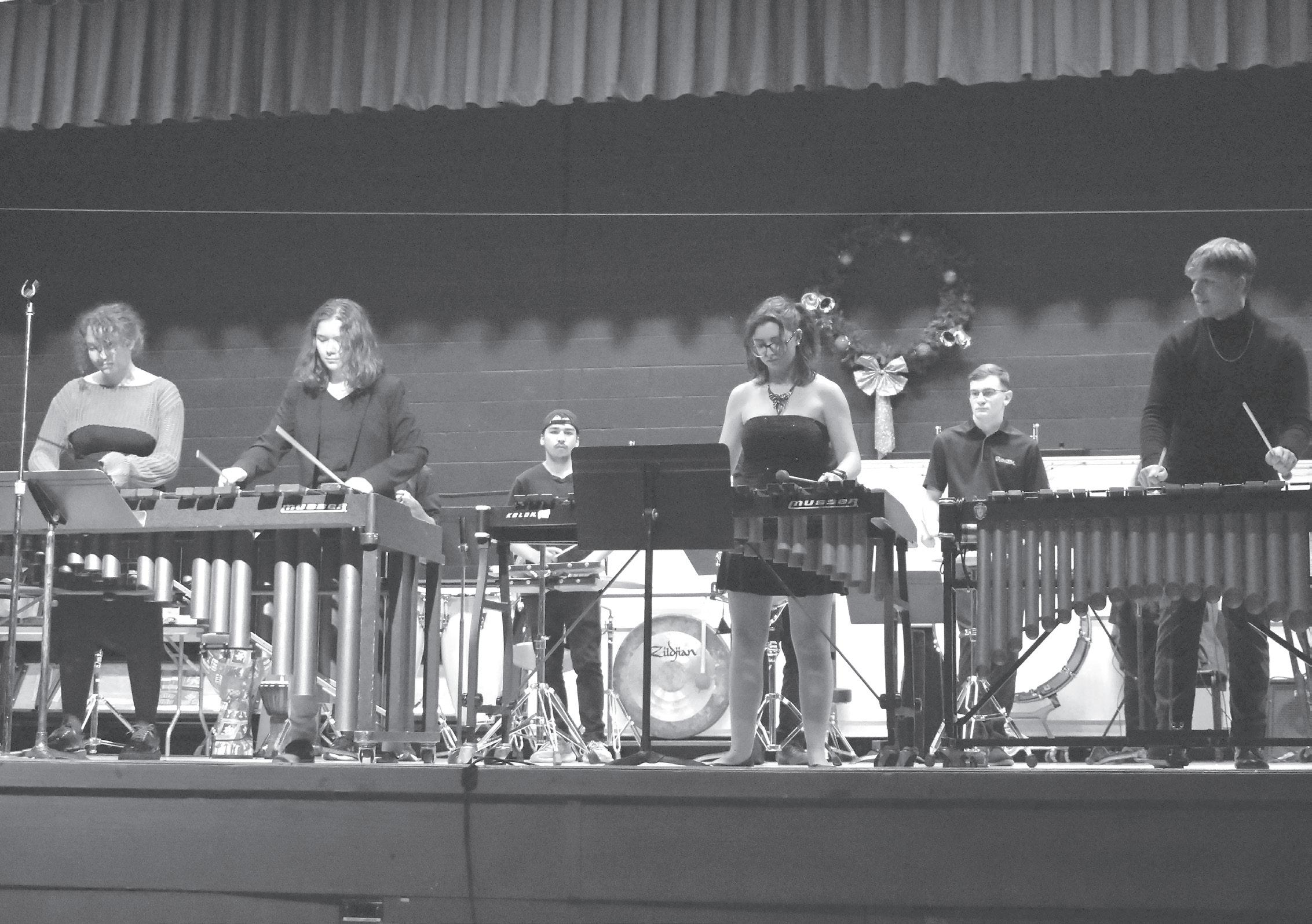
2024 AUDITION DATES MARCH 2 Scholarships available to majors and non-majors
FLUTE CHOIR DAY • APRIL 13
ANNUAL NECESSARY NOISE PERCUSSION FESTIVAL • APRIL 20

maureenbutlermusic[at]gmail.com
The February conference included a variety of sessions that focused on how to make music more accessible to students with disabilities. Many thanks to all the presenters who shared their valuable insight, experiences and strategies, as well as to the participants of the sessions. It’s when we network with others that we support and learn from each other - which is beneficial for us as well as our students!

At this point in the school year, it’s more important than ever that we don’t lose sight of the students with disabilities in our classrooms. Let’s continue to evaluate how they are managing, and seek ways to ensure that they are learning in ways that are meaningful and enriching. If you have questions or concerns, feel free to reach out to me. The members of our state Accessible Music Education committee have a variety of experiences and backgrounds, and are always happy to help.
Also, if you’ve developed successful strategies that you’d like to share, consider writing about them in TEMPO. Your insight could be just what someone else is looking for!
Alfred Hadinger
alfred_hadinger[at]nplainfield.org
Welcome to March! Between Music in our Schools Month, spring musicals and more, it is a busy time ofyear for many programs. How are you bringing music to your school and community this month?
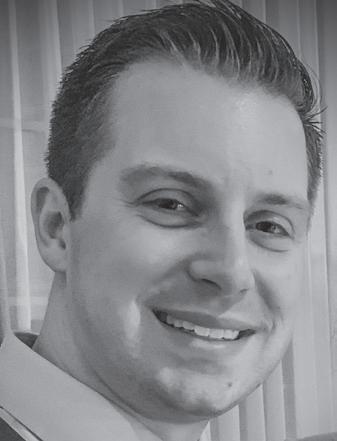
We hope you enjoyed this year’s New Jersey Music Educators Association State Conference. Congratulations to our all-state musicians, all presenters and performers, and thank you to NJMEA leadership for another successful event!
As a reminder, membership in the New Jersey Music Administrators Association is open to any school administrator whose responsibilities include oversight of a music program. We welcome any principal, assistant principal, or supervisor who would like to network with other colleagues from around the state.
More information regarding membership can be found on our website, www.njmaa.org.


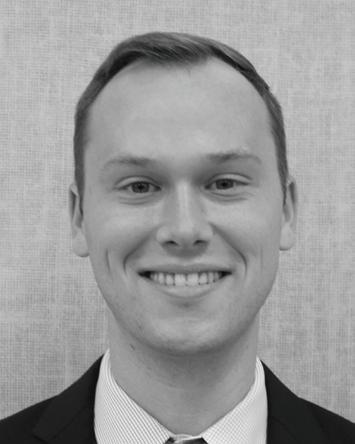
Congratulations and great work to all of our 2024 All State Band students on an incredible concert series last month! If you were not able to join us, both the Symphonic Band and Wind Ensemble held successful concerts at both the convention in Atlantic City and the New Jersey Performing Arts Center in Newark. Well done to the Treble Choir as well, who performed on that program. The work the students have put in over the last several months, beginning with their region auditions, is remarkable, and we applaud them on a job well done.
Thank you to our conductors, Dr. Peter Boonshaft and Dr. Joseph Higgins, for their time, energy and passion in helping our ensembles reach their highest potential. Thank you to our managers (Pamela Ferrali, Jayden Fusco, Allan Dalleus and Ryan Ward), who were instrumental in ensuring both students and conductors had what they needed, and helped the many layers of logistics run smoothly. A huge thank you to Tyler Wiernusz, our All State Procedures Chair, and the whole All State Band committee for their efforts in making the experience the best it could be from the first day of planning a year ago. We were grateful to John Zazzali and Nick Mossa at JP Stevens High School and Bridgewater Raritan High School, respectively, for hosting our auditions and reading rehearsal - thank you. A big thank you to Joe Cantaffa and Marie Malara for their assistance in everything production and scheduling as they integrated us into the conference and gave our students not just an experience in musicianship but professionalism. Finally, thank you to our partners at NJPAC. We are very fortunate to have the opportunity to bring our students to a world class venue.
If you have any questions or concerns as we reflect on the work of our all state season, please don’t hesitate to reach out. We are always working to make communications more clear and everything as accessible as possible, so hopefully you notice some small changes as we look to next year. Thank you for all you do.
It was great to connect with you all at our Annual State Conference! The DEIA Committee hosted several sessions and engaged in meaningful conversations centered around Diversity, Equity, Inclusion, and Access. The conference is always an excellent reminder of how many talented and dedicated music teachers work in our state.
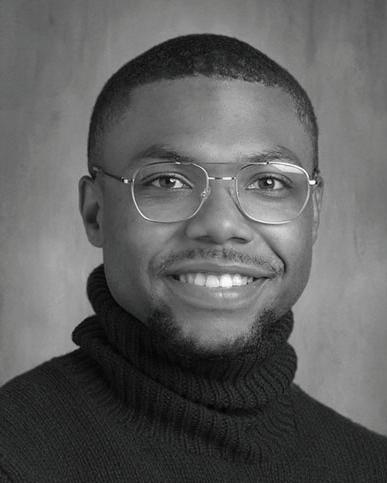
We would like to welcome SJBODA’s new DEI Chair, Emma Gibbins! We are very excited for her to bring her insights and experiences to the committee.
Feel free to email deia.njmea[at]gmail.com to learn more about our various initiatives or to join our team.

Susan Meuse
susanmeuse[at]gmail.com
As I am writing this, we are preparing for both the NJMEA High School and Middle School Orchestra Festivals. Thank you so much to our hosts, Jenna DiSalvio (Egg Harbor Twp. HS), Jim Millar (Tenafly HS), and Caty Butler and Emma Piedilato (Bridgewater-Raritan MS). Look for photos in the May issue of Tempo.

The Orchestra Procedures Committee is preparing for our March ASO and ASIO auditions at JP Stevens HS. Thanks to Auditions Chair Sue Mark for all of her hard work. The committee will be meeting during auditions to discuss the solos and excerpts for next year. Good luck to all of the students who are auditioning!
I was recently able to attend an online meeting of the NAfME Orchestra Council. The council is made up of orchestra teachers from all over the country with a representative from each NAfME division. The group had some great discussions about challenges that orchestra teachers are facing as well as things that NAfME can do to support orchestra teachers. Please reach out to me if you would like to know more.
Kathleen Spadafino kspadeb[at]aol.com

We retirees had a great time at the NJMEA conference in Atlantic City! Our President Ron Dolce led an informative meeting during our breakfast meeting, and we got some good ideas for future outings. We also felt very proud of Patrick Hachey, who was the 2024 recipient of the Master Music Teacher award. It was a joy to observe his class, and his speech at the conference was very inspiring to all who were there. Everyone, please take a look around and nominate one of your fellow music educators for the 2025 Master Music Teacher award! There are so many fabulous musicians teaching through New Jersey, and we would love to come observe their classes. The form for nomination is on the NJMEA website, and the deadline is March 15. So please take a few minutes (I know this is a busy time) and nominate one of your colleagues. And stay tuned for information about another NJMEA outing in May! We would love to hear from you - email Kathy at kspadeb[at]aol.com or Ron at rdolce561[at]aol.com.

Amy M. Burns
aburns[at]fhcds.org

I hope that you all enjoyed the NJMEA Conference. It was wonderful to see you all there! On Sunday, March 3, I will be attending the NJMEA Sunday Office Hours to host a recap of the elementary sessions. I hope that you will join me online. Plus, don't forget to register for NJSMA's Saturday Annual Workshop, "It's Elementary, My Dear" on April 6, where Amy Paz, Sebastian Guerro, and I will be presenting elementary music workshops on choral, drumming, and PK/K activities. The day ends with a choral reading session run by Trish Joyce and the Primo Coro Choir. Registration is due by April 3 to pay the lower price and can be found here: https://shorturl.at/oFKXY or you can pay at the door at the higher price. You do not want to miss this!
Shawna Longo
shawnalongo[at]gmail.com
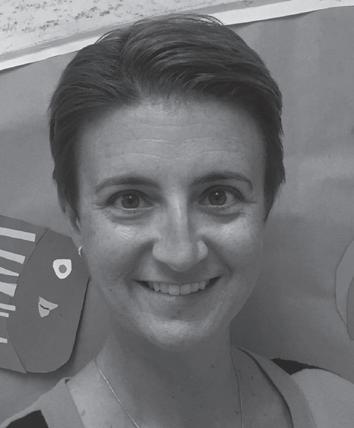
Wow! What a year! I am very excited about the revamped Music Technology Festival that occurred on Thursday, February 22 and was aligned with the NJMEA Conference Technology Academies. If you want to learn more about how you may be able to include your high students next year, feel free to reach out to me via email or directly to Vincent DuBeau (vdubeau[at]delsearegional.us). Also, did you know that any NJMEA member can attend the Music Tech Fest?? Come and check it out while you’re at the conference next year to see what all the buzz is about!!
Our NJMEA Conference in Atlantic City also featured two technology academies: K-8 General Music and HS Music Production. We brought in many amazing clinicians from across the country! The list included many nationally recognized presenters including Dr. Barbara Freedman, Katie Argyle, Amy Burns, Gillian Desmarias, Robby Burns, June Kinoshita & Cece Roudabush, Danielle Collins, and E. Michael Harrington. If you are a music technology teacher and are interested in featuring your students at our 2025 conference and/or if you have any ideas for potential presenters or topics, please let me know! I am already busy working on our technology academies line-up as well as the Music Tech Fest, which I promise will not disappoint!
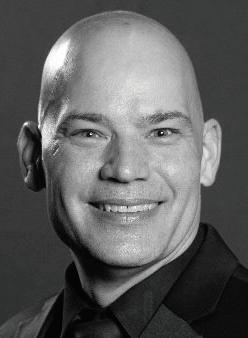
Roxbury High School - Roxbury
Patrick Hachey, Director of Choral Activities and Lead Teacher for the Performing Arts Grades 5-12, has been a music educator for 25 years, and is currently in his 20th year of teaching at Roxbury High School in Succasunna, NJ. Patrick holds a Bachelor of Music Education degree and a Master of Music in Vocal Performance degree from Indiana University at Bloomington. While studying at IU, he served two years as the assistant director of the world-renowned Singing Hoosiers and was a founding member of the well-known men’s a cappella group, Straight No Chaser. In 2011, Patrick was awarded the Singing Hoosiers Alumni Council Distinguished Alumni Award.
Before coming to Roxbury Township, Patrick held choral directing positions at Pequannock Township High School, Pompton Plains, NJ, and Hanover Park High School, East Hanover, NJ. During his time at Roxbury High School, he has conducted the Classic Sounds Honors, Roxbury Chorale, Vocal Jazz, Revelation, Melodies, Madrigals, Concert Choir, Freshman Treble Choir, and the Eighth Grade Chorus at the district’s middle school. Under his direction, Roxbury Melodies, the select treble choir, was selected as a performance
ensemble for the 2014 ACDA Eastern Division Conference in Baltimore. In 2019, the Classic Sounds Honors performed at the National Association for Music Education Eastern Division Conference in Pittsburgh. Classic Sounds was also selected to perform at the 2022 ACDA Eastern Region Conference in Boston.
In addition, Patrick serves as Drama Advisor at Roxbury High School, directing both the Fall Drama and the Spring Musical, and has a studio of private voice students. Still active as a lyric baritone in the New York metropolitan area, he has vast experience in solo performance, including classical art song, opera, musical theater, jazz and pop styles.
Patrick was the guest conductor of the 2006 & 2012 Sussex County High School Honors Choirs, the 2008 NJ Region I Mixed Choir, and the 2013 NJ Region II Women’s Choir. In 2017, Mr. Hachey was selected to conduct the New Jersey All-State Mixed Choir. He is a sought-after choral clinician throughout the Northeast, having adjudicated in Pennsylvania, Delaware, and New Jersey, and has served as the Treasurer for the New Jersey American Choral Directors Association Executive Board since 2010.
Riverwalk Plaza
Riverwalk Plaza

276 Morris Avenue
276 Morris Avenue
34 Ridgedale Avenue
34 Ridgedale Avenue
East Hanover, NJ 07936 (973) 428-0405
East Hanover, NJ 07936 (973) 428-0405
Springfield, NJ 07081 (973) 476-4888
Springfield, NJ 07081 (973) 476-4688

The Crescendo Foundation is a Not For Profit Corporation initially formed by leadership of the New Jersey Music Educators Association, who serves as the registered agent. The Association’s mission includes the advancement of music instruction in New Jersey’s educational institutions at all levels that provide in-service and enrichment opportunities for music educators, as well as sponsoring various festivals and All-State performing groups for K-12 students. As a result, the Foundation’s goal is to provide financial support to underserved students and communities to create access to the aforementioned festivals and performing groups. In this first phase of giving, funds will go to a scholarship model geared towards students aspiring to participate in All-State ensembles.
Through data assessment, it has been identified that All-State ensemble participation is not reflective of statewide total population demographics when comparing race and socio-economic status. The scholarship opportunities from the Crescendo Foundation gifts will allow students to apply for financial support to assist with any or all of the fees associated with participation including:
• Audition Fee - $25
• Participation Fee - $35
• Housing - $315
As part of the All-State experience and upon acceptance, students are housed together throughout the performance weekend. Scholarship opportunities would be available to cover the entire cost of this invaluable experience. In subsidizing these costs for qualified students and easing the burden of financial access, it is the hope of the Foundation that our All-State programming will become more inclusive, diverse and equitable.
We acknowledge that the Foundation’s ability to realize the plans outlined in the Scholarship program will require the generous support of the community. The initial phase of the program will require $50,000 which aims to assist 150 students over the course of the next three years in the areas of All-State Orchestra, Choir, Band and Jazz. All-State ensembles contribute to a total of 6 concerts annually in both Atlantic City and Newark. The vision for the Foundation is to eventually go beyond the scope of All-State ensembles to positively support several aspects of music education programming both at the State and Region levels, making this an important first step.
All gifts are tax deductible and there are many ways and opportunities to support this important effort. We thank you in advance for your support of our state’s students and providing transformative experiences outside of their school programs.

Large Ensemble Concert Sponsorship - $5,000
• All State Orchestra and Mixed Chorus, Atlantic City
• All State Orchestra and Mixed Chorus, New Jersey Performing Arts Center, Newark
• All State Symphonic Band, Wind Ensemble and Treble Chorus, Atlantic City
• All State Symphonic Band, Wind Ensemble and Treble Chorus, NJPAC, Newark
Concert Sponsorship - $2,500
• All State Jazz, Atlantic City
• All State Jazz, New Jersey Performing Arts Center, Newark
Crescendo Giving Level - $1,000
Sforzando Giving Level - $500
Arts Advocate - $250
Friends of the Arts - $100
Other $_____________
All gifts and giving levels will be recognized in programs for that school year and program cycle, including concerts listed above, as well as NJMEA conference materials.
All gifts are tax deductible. Checks should be made payable and sent to:
The Crescendo Foundation
300 W Somerdale Road, Suite C Voorhees, NJ 08043-2236
Please include contact information and appropriate name listing for program printing.

Recently, a member of the Midnight Music Community brought up an interesting topic: "10 Things I Wish I Knew Before Teaching." Several members, me included, provided their insights. Following that, Midnight Music posed a similar question on their Facebook Group, asking for advice that we would give to new teachers. That question and this topic change for me annually as what I felt I needed to know when I first started teaching is not what I would advise 25+ years later. Here are 10 items I wish I knew before teaching elementary general music and would give advice to a new teacher today.
1. During your first year, take on any recess or car duties that a senior teacher asks you to cover for them.
Reasoning: You need to build relationships with the teachers as you will probably need their assistance at some point during the year whether for concerts, shows, etc. Moreover, teachers possess a wealth of knowledge about the school and the parent/family body, making their information valuable.
2. Learn the names of all administrative assistants, facilities crew, cleanup crew, and kitchen crew, and give them appreciation gifts or notes every few months as they run the school.
Reasoning: Because they run the school, they know all, you cannot run your program without them, and they rarely have a break.
3. Even if you have very little earnings, contribute to your 401/403b retirement plan from the very beginning. You will thank yourself in 20 years.
Reasoning: The post-school debt monster is a tough beast to beat, and with monthly bills piling up, it's tough to make ends meet, let alone think about retirement. But don't lose hope! As your career takes off, things will get better, and starting your retirement plan early will be a genius move! Trust us, catching up later in life is like trying to chase a cheetah with a broken leg.
4. Find any and every way to connect with your students even if it means you are showcasing or sprinkling in music that you do not always appreciate or trying new things that ultimately fail.
Reasoning: Relationships. As we need to build relationships with our colleagues, it is also important to build relationships with your students. When they feel like they can count on you and catch your contagious enthusiasm, your classes will be the hot spot everyone's talking about.
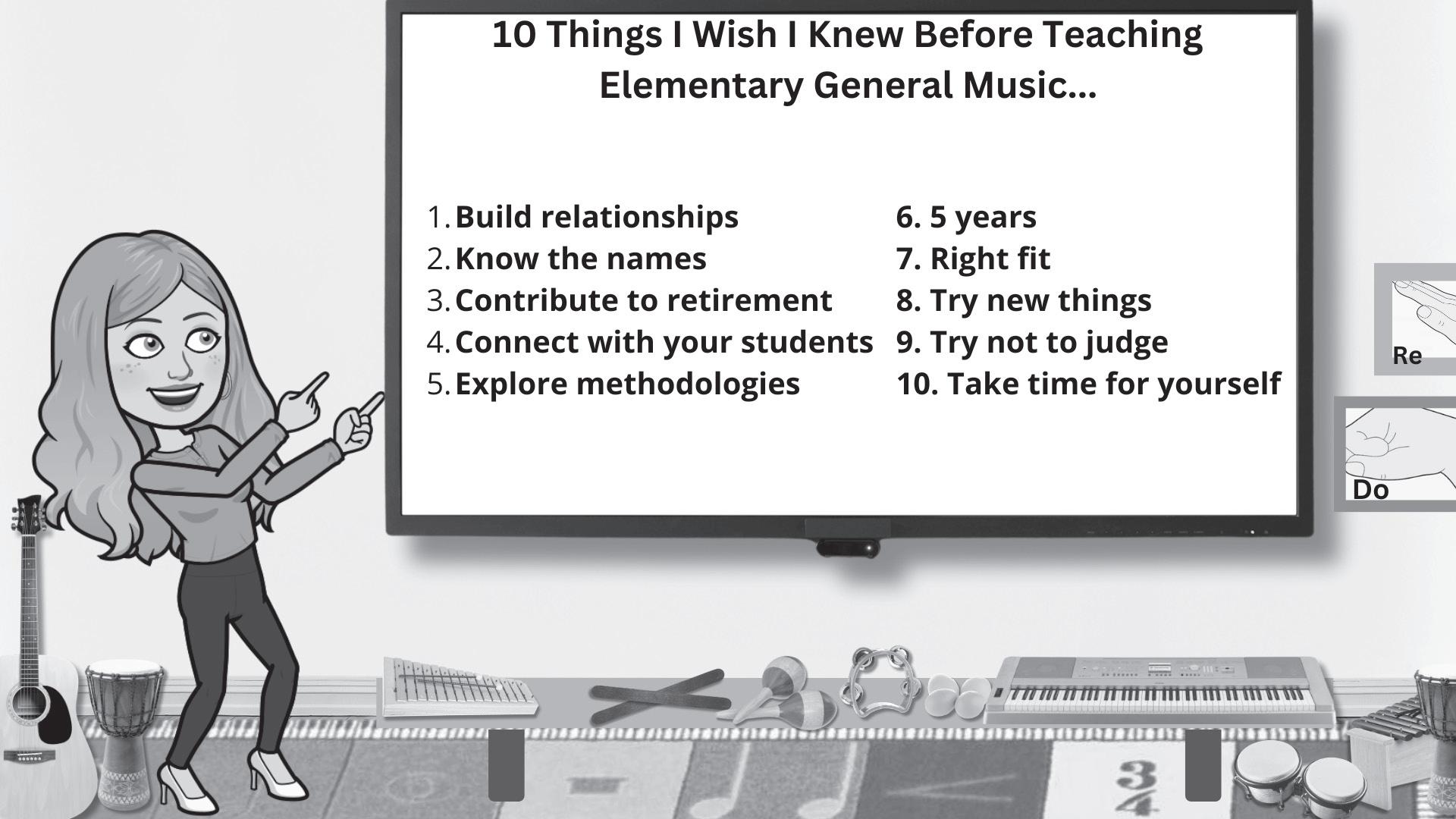
5. Discover various methodologies and approaches and identify the one (or ones) that suits you best.
Reasoning: In my experience, sticking with a single methodology or approach often proves insufficient for me and my students. Instead, I find that researching and implementing various techniques – a combination of them, even – yields better results in the classroom. That being said, I've encountered several exceptional music teachers who successfully employ a single approach for their elementary students. Ultimately, it's essential to determine what works best for you and your learners and to pursue that path wholeheartedly.
6. Remember that it takes at least 5 years for you to build your program to the inkling of what you want it to be. And then even more years to get it to be what you envisioned.
Reasoning: If you take over from an adored music teacher, you'll have big shoes to fill, and comparisons might linger for a while. But, as your students grow and develop, you'll carve your own path and create a program that's uniquely yours. Alternatively, if you're starting from scratch in a program that's never had a consistent music teacher, building trust with students, colleagues, and families will take some time, but don't worry! Stay calm, stay patient, and keep reminding yourself that great things take time. Trust the process, and soon you'll have a music program that'll rock your socks off!
7. However, also remember that some schools and administration are not the right fit for you. And when you realize that, look for other places to teach. Don't give up on teaching just yet.
8. Try new things. Think outside the box.
Reasoning: You just never know what might strike a chord with you and your students.
9. If you can, try not to judge other teachers. You never know what they are going through on that day. This is easier said than done.
Reasoning: Our teaching emphasizes the importance of leading with kindness and empathy. While these values guide us in most cases, conflicts can arise, and it's necessary to explore alternative resolution methods. Nevertheless, we strive to begin by prioritizing kindness and empathy.
10. If you can, take time for yourself at least once a week. This is challenging because life is busy and can be tough but try to find those minutes of mindfulness.
Reasoning: Life can be unpredictable, and sometimes, it feels like we're running a marathon with no breaks in sight. We all have those days when we can hit the gym, read a chapter of a book, and even squeeze in a little "me time". But, let's face it, there are days when it feels like we're last on our own priority list. In those moments, it's important to muster all your strength and carve out a little time for yourself. Even if it's just ten minutes to sip your favorite drink, give yourself permission to enjoy those moments. Remember, you deserve it, and a little self-care goes a long way!
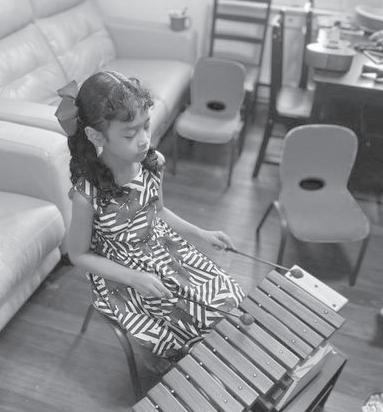
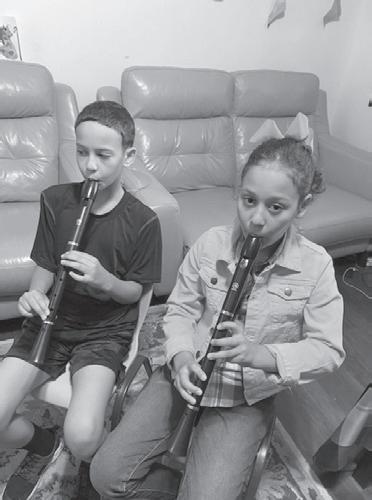

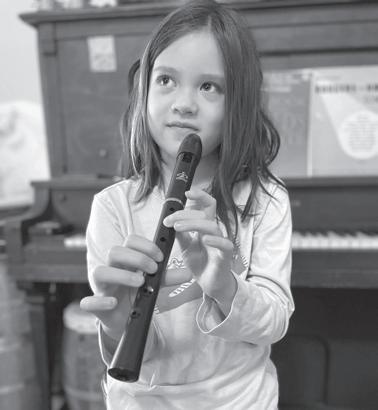




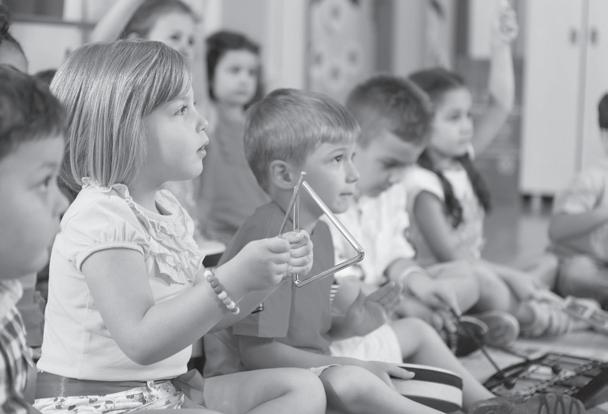
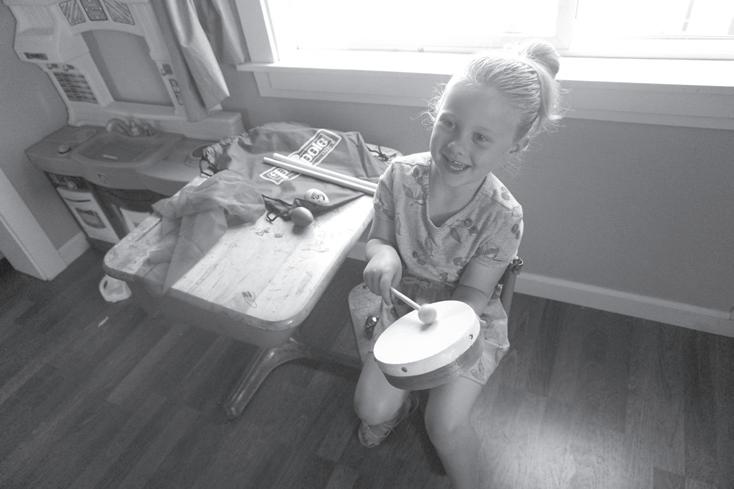
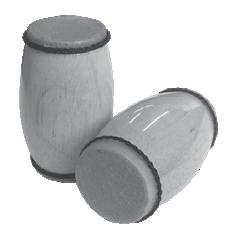
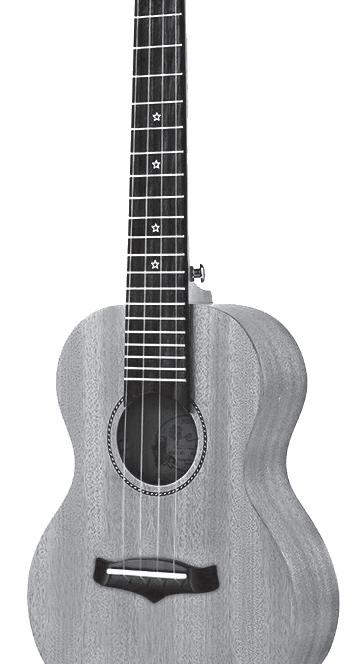
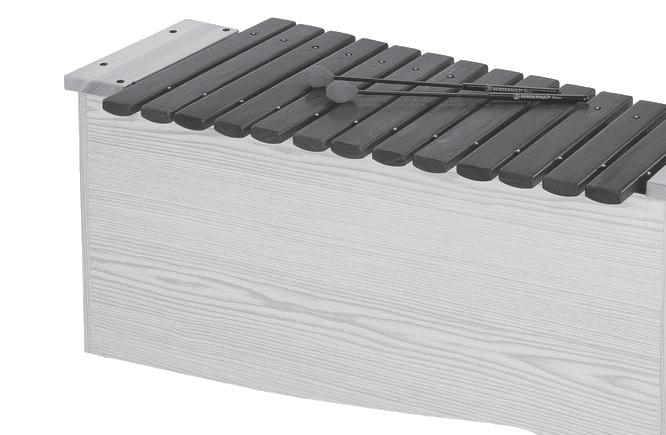



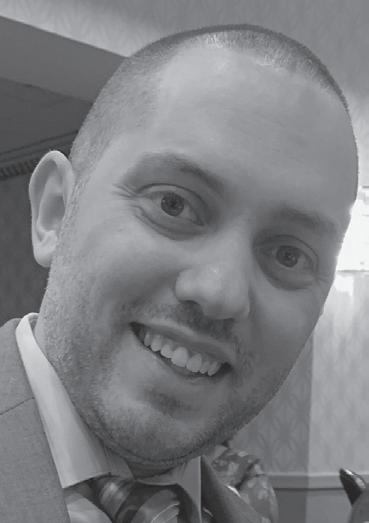
Jayson Martinez
NJMEA Guitar Education Liaison
jmarti37[at]webmail.essex.edu
The year 2023 proved to be an exceptional year for our NJMEA Guitar Ensemble. We achieved success in three separate performances at the Long Island Guitar Festival, New Jersey City University GuitarFest, and Kean University GuitarFest. Also, thanks to the generous support of the Augustine Foundation, the NJMEA Guitar Ensemble recorded their fourth Virtual Guitar Orchestra video. The composition, titled "Pulsar" by Vincent L. Clark, garnered close to 10,000 views within a week of its debut. Perhaps the most remarkable event in 2023 was the joint performance of the NJMEA and NJGO ensembles, showcasing the "Concierto de Los Angeles" with the distinguished Grammy Award recipient, William Kanengiser.
We are excited to announce that our NJMEA Honors Guitar Ensemble and the New Jersey Guitar Orchestra (NJGO) will collaborate once again on four concerts throughout the spring and summer of 2024. One of our featured events, the NJCU GuitarFest, will showcase a commissioned piece titled "Catwalk" by Andrew York, a Grammy Award-winning guitarist and composer. Mr. York will present a solo recital at this momentous occasion, which will culminate in a performance by the NJMEA Guitar Ensemble, the NJGO, and the New York City Classical Guitar Orchestra.
Arguably the most exciting performance of this season will be held at the Laureates Gala, hosted at the prestigious Weill Recital Hall in Carnegie Hall. The NJMEA Guitar Ensemble has received the prestigious invitation to perform as the opening act for the esteemed Laureate Guitar Ensemble. Here is a list of all the dates and information below.
Long Island Guitar Festival
Saturday, April 28th @12:00pm
Setauket Presbyterian Church
5 Caroline Avenue, Setauket, NY 11733 http://www.ligfest.net/ https://www.setauketpresbyterian.org
GuitarFest featuring Andrew York
Tuesday, May 7th @6:00pm
New Jersey City University
2039 JFK Blvd, Jersey City, NJ https://www.njcu.edu/
GuitarFest featuring Celil Refik Kaya
Saturday , June 15th @4:00pm
Kean University
1000 Morris Avenue, Union, NJ www.kean.edu
Laureate Galas at Carnegie Hall
w/ special guests: NJMEA Guitar Ensemble and the NJGO
Tuesday, July 1st@7:00pm
Carnegie Hall - Weill Hall
881 7th Avenue, New York City carnegiehall.org
Julio Reyes, a renowned concert guitarist and conductor, leads the Laureate Guitar Ensemble. The ensemble consists of approximately 50 guitarists, including high school students, professors, and professional recording artists. They come from a diverse range of twenty states and seven countries. Also, the NJMEA Honors Guitar Ensemble expresses their appreciation to Dr. Desamparados Fabra, Chair of the NJCU MDT Department, Dr. Matthew Halper, Chair of the Kean MDT Department, and Dr. Michael Newman and Dr. Celil Refik Kaya, esteemed professors of guitar, for graciously allowing us to use your campuses for our rehearsals. New Jersey City University and Kean University have established a robust partnership in the field of guitar education. On a personal note, I would like to extend my sincere gratitude and appreciation to the GRAMMY Foundation for selecting me as a nominee for the prestigious title of 2024 Teacher of the Year. It is my honor to be nominated and be recognized for serving the students of the great state of New Jersey.
We are looking forward to seeing you all at our concerts!
For more information, including concert programs for each performance, visit my website www.jaysonmartinez.org.
BACHELOR OF MUSIC Music Education Performance Composition
SELINSGROVE, PENNSYLVANIA
SUSQU.EDU/MUSIC
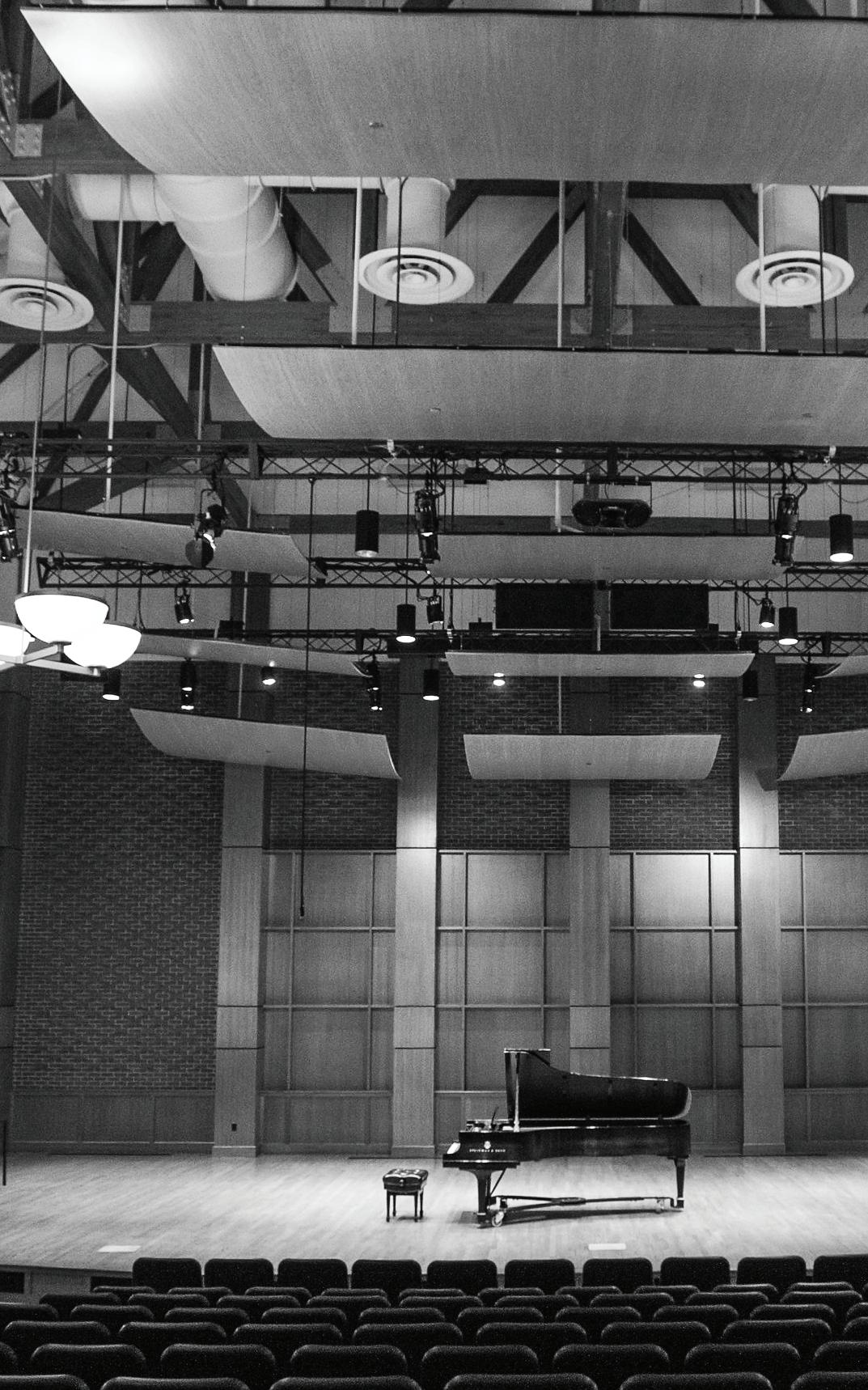
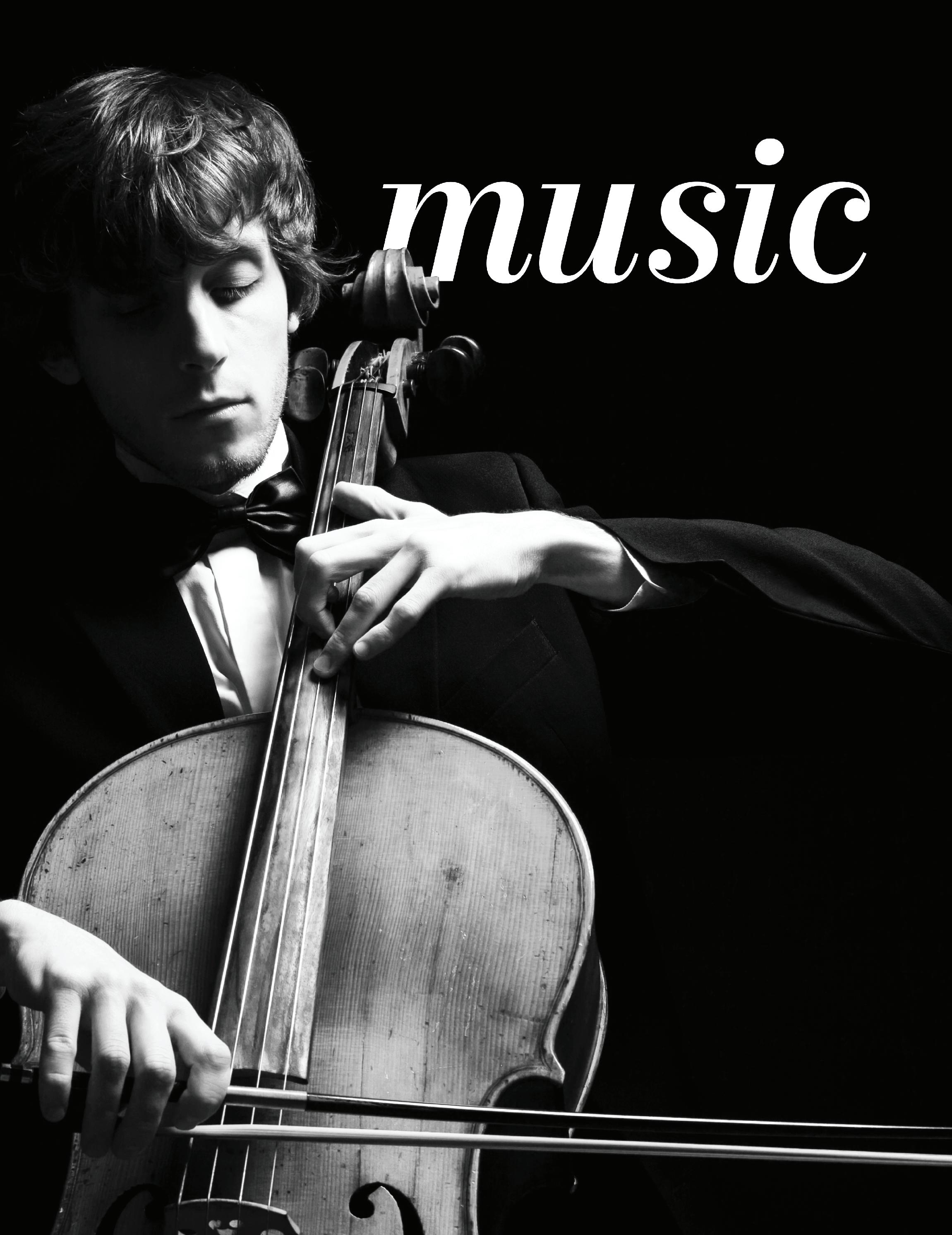

shawnalongo[at]gmail.com
Last May, I published an article in TEMPO providing 10+ ways to use ChatGPT in music education. AI is an exciting, yet somewhat intimidating, innovation in teaching and learning. And to be transparent, I used Bard to assist me in writing this article.
AI is rapidly changing the way we learn and interact with music, offering exciting new possibilities for educators and students alike. But, whether we realized it or not, music education has actually been interacting with artificial intelligence (AI) for many years through the use of software like PracticeFirst, SmartMusic, SoundCheck, and others.
AI has the potential to revolutionize education by tailoring learning experiences, empowering educators, and cultivating critical thinking and innovation in students. Here's how:
Enhancing Learning Experiences:
● Personalized Learning: AI-powered platforms can analyze student data to create customized learning paths, cater to different learning styles, and adjust difficulty levels based on individual progress. This keeps students engaged and challenged, ensuring they grasp concepts before moving on.
● Immersive Environments: Virtual reality and augmented reality, powered by AI, can create interactive and engaging learning environments. Imagine exploring the performance venue in another country in VR or dissecting historical events in AR related to a piece you are performing, bringing abstract concepts to life.
● Adaptive Content: AI can curate and modify learning materials to suit individual needs. We already have software programs that give explanations, provide pieces of music based on a student's performance level, and adapt in difficulty as they master skills.
Supporting Educators:
● Automated Tasks: AI can handle repetitive tasks like grading quizzes or scheduling, freeing up educators' time for more personalized interaction with students. Imagine AI graders providing detailed feedback while the teacher works with struggling students to address specific learning gaps.
● Real-time Insights: AI can analyze student data to identify struggling students or potential misconceptions, allowing edu-
cators to intervene early and provide targeted support. Imagine a software program alerting the teacher when a student consistently struggles with a specific musical skill, prompting a one-on-one intervention…this is already available!
● Professional Development: AI can personalize professional development for educators, suggesting relevant resources and courses based on their individual needs and teaching styles. Imagine an AI tool recommending teaching strategies or online courses tailored to a specific lesson plan.
● Open-ended Problem Solving: AI can generate realistic simulations and scenarios for students to experiment and solve problems collaboratively. This will foster the development of critical thinking and problem-solving skills.
● Creative Exploration: AI can generate prompts and tools for creative expression, encouraging students to think outside the box and explore new ideas. Imagine using AI to write original music or generate art based on student input, sparking imagination and creative exploration.
● Debiasing Information: AI can help students assess the validity and bias of information online, developing critical thinking skills. Imagine students using AI-powered tools to factcheck news articles or identify biased language in historical documents related to pieces of music that you are studying.
Important Caveats:
● AI is all left-brain: While AI can generate text based on patterns and structures it has learned from its training data, it does NOT have the ability to generate new, innovative, creative ideas to solve complex problems.
● AI as a Tool, not a Replacement: AI should be viewed as a valuable tool to support educators, not replace them. The human touch and guidance of educators remain essential for nurturing critical thinking, empathy, and social-emotional skills.
● Ensuring Equity and Access: It's crucial to ensure AI-powered tools are accessible to all students and do not exacerbate existing inequalities. Careful development and ethical considerations are needed to avoid bias and discrimination.
● Developing Critical Thinking Skills about AI: Students need
to learn how AI works, its limitations and biases, and how to evaluate its outputs critically. This is crucial for navigating the increasingly AI-driven world.
The Human Touch in the Age of AI:
While AI offers a plethora of benefits for music education, it is important to remember that technology cannot replace the human touch. The role of the music teacher will always be crucial in providing guidance, inspiration, and emotional support to students. AI should be seen as a valuable tool to complement and enhance traditional music education, not replace it. Think of an AI ChatBot as a brainstorming partner. For more on how AI will not replace music teachers, please check out Dr. Jim Frankel’s blog as noted in the resources at the end of this article.
The integration of AI into music education is still in its early stages, but its potential is undeniable. As AI technology continues to evolve, we can expect even more innovative and transformative tools to emerge, shaping the future of music learning for generations to come.
The ethical considerations of using AI in education, such as data privacy, bias, and the potential for overreliance on technol-
ogy, are important to address. However, when used responsibly and thoughtfully, AI has the power to democratize access to music education, personalize learning experiences, and ignite a lifelong love of music in students around the world.
So, let the symphony of AI begin! The future of music education is full of exciting possibilities, and we are all invited to join the chorus.
Resources:
● No, AI Won’t Replace Music Teachers - blog by Dr. Jim Frankel https://www.musictechhelper.com/blog/no-ai-wont-replace-music-teachers
● Canva - free, includes AI powered Magic Design features to enhance images even more
● EduAide.Ai - free, AI-powered platform that helps teachers create educational resources
● MagicSchool.Ai - free, AI-powered platform that helps teachers lesson plan, differentiate, write assessments, write IEPs, communicate clearly and more!
● QuestionWell - generates an endless supply of questions
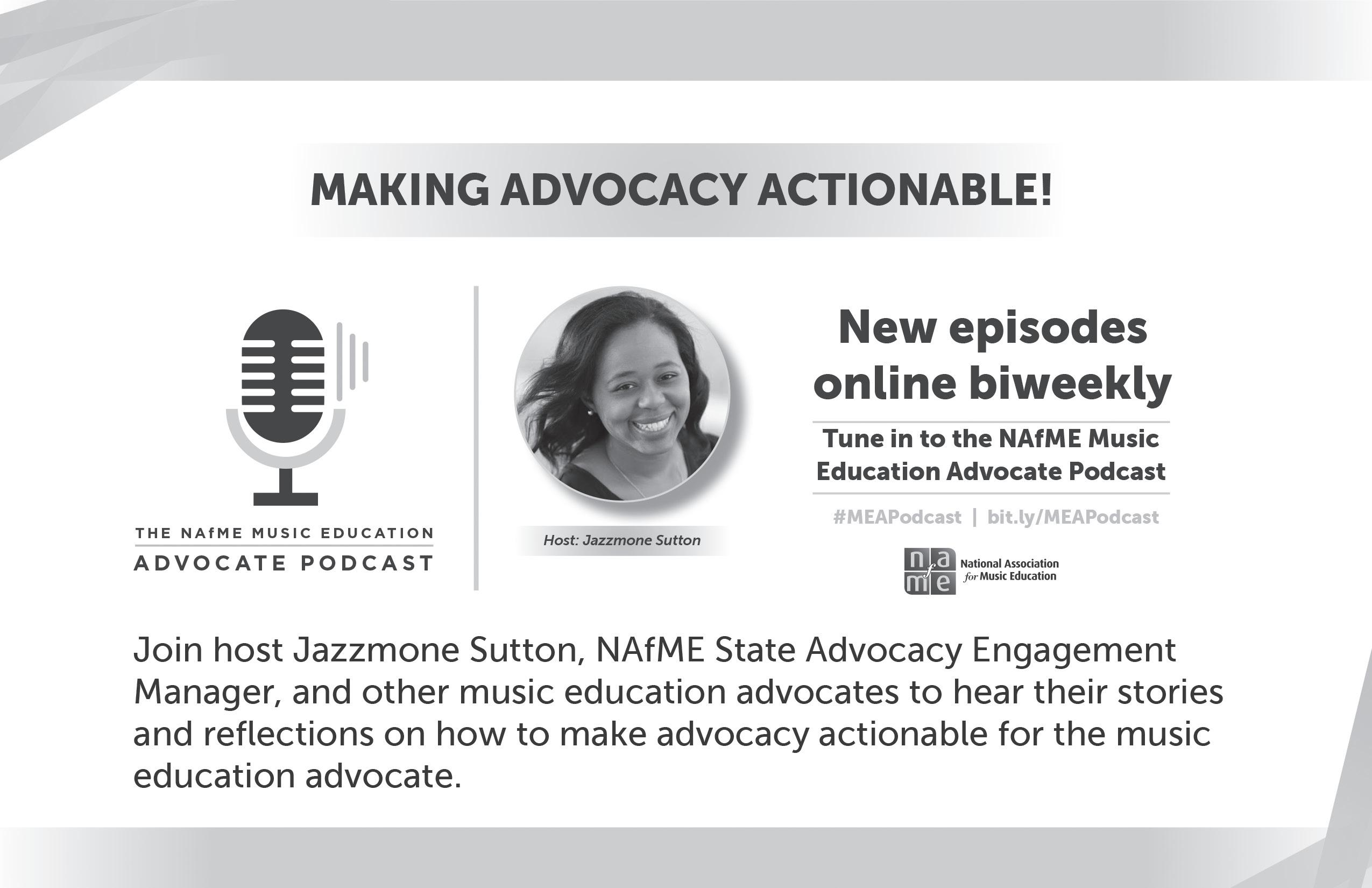
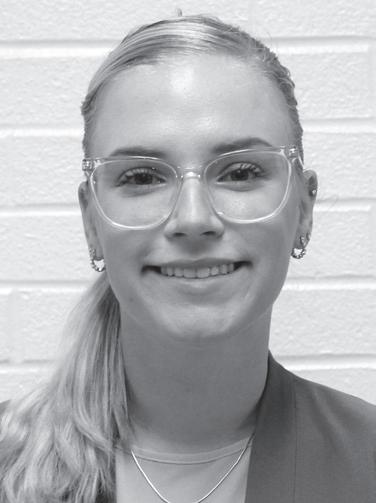
Mackenzie Miller Teachers College - Columbia University mm6077[at]tc.columbia.edu
When you think back to performing in your secondary or undergraduate ensembles, how often did you or another ensemble member change the parts you played in each selection during the concert? Did all the same musicians always play Flute 1 throughout the entire concert? In my experience, not every section made a habit of rotating parts. Sections with more instruments such as the trumpets and flutes had a greater chance to be rotated than those such as the oboe with two musicians. How does this affect the students themselves? Giving the same students 2nd or 3rd parts has affected students continuing on with their instrument studies in middle or high school. When asked, “Why did you stop playing?” A lot of responses have to do with “I wasn’t good enough” or “because of my music teacher.” As educators, we have the power to make the musical experience more enjoyable for our students. We can start as early as middle school and progress through high school to keep these musicians in musical ensembles.
I have seen how the failure to rotate parts during a concert or school year is detrimental to student musicians. The stronger players were always given 1st parts while the less strong
stayed on 2nd or 3rd parts. This happened in each ensemble I performed in. Because I was routinely kept on 2nd and 3rd parts, I deduced that I was one of the less-strong players, or so I was made to feel. If given the opportunity to rotate parts more often, my confidence as a musician and student would have risen. This experience has led me to rotate parts for my students. As a Music Educator, I never want any students to feel less about themselves due to what part they perform in an ensemble because that may hurt their motivation and selfsufficiency not only in music, but life.
Seating should not necessarily be based on the ranking of performers for each piece. Rather, parts may be rotated from piece to piece and from concert to concert. Every member of the ensemble plays an important role. “Rotating has the benefit of putting people in different physical parts of the section, having them gain perspective and experience for being near or far away from the conductor, being closer or less close to the audience, for being in the middle of the orchestra or on the periphery, etc” (Niles). We have established that there are problems with an orchestral seating system that ranks its play-
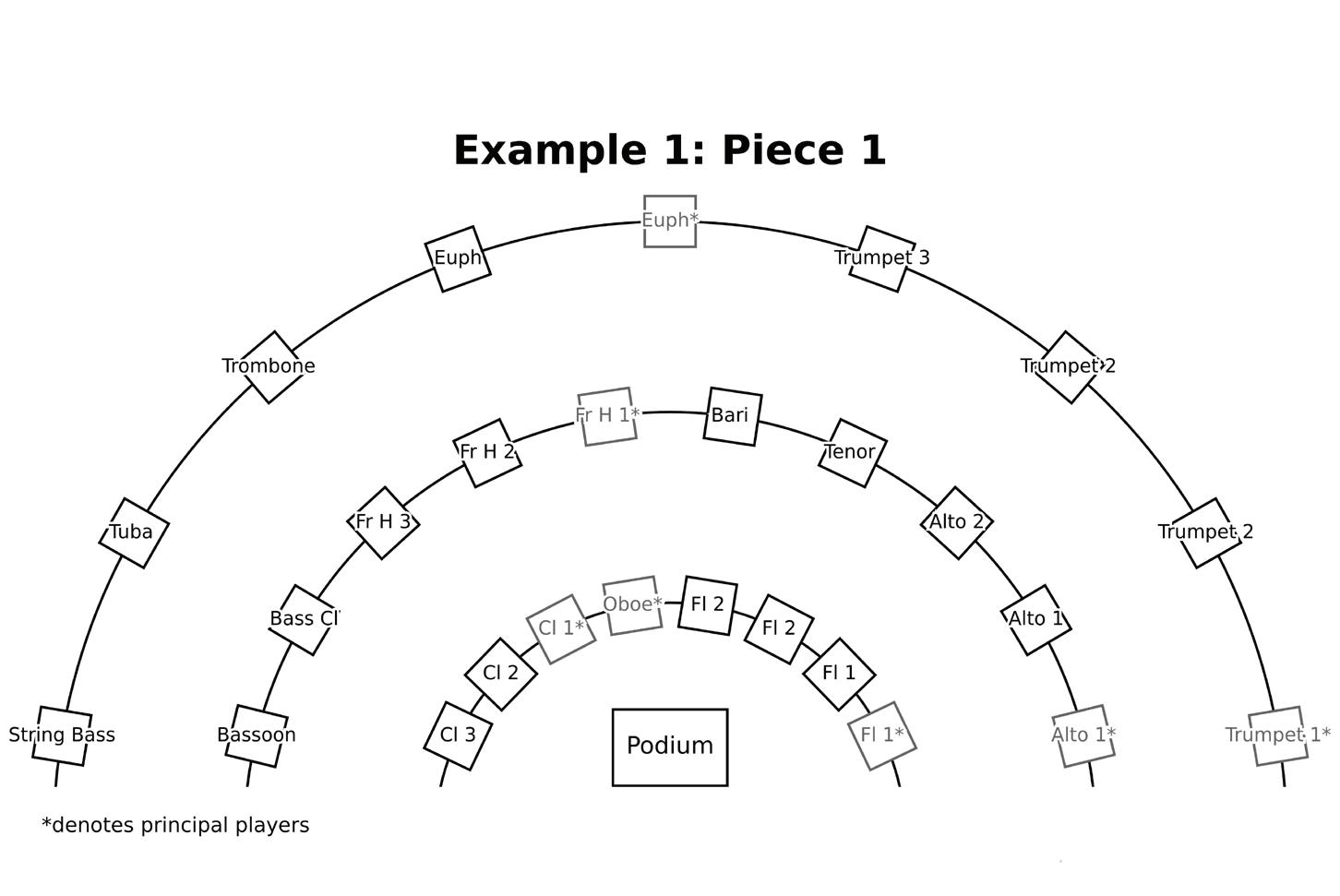
ers first-to-last, with the idea that the "best" are in front and play 1st while the "worst" are in the back and play 2nd or 3rd parts. It's a system that has shaped attitudes in ways that are competitive and deceiving, rather than supportive and cooperative. Additionally, it doesn't necessarily provide balance or lend strength to the section. The principal player of each section of the ensemble may also be included in rotation of parts to pieces. This gives the player more responsibility to lead the section even from the 2nd or 3rd part. This also gives them the opportunity to listen to their section and help create a balanced sound and lead by example. According to the Manhattan School of Music Orchestra handbook “String seating in particular, while driven by placement audition results, is made with an eye to creating a strong overall section and to giving students experience in different positions in a section. Occasionally, certain ensembles may use a rotating seat format” (pg 3).
As an educator, I am making an effort to stop this common trend. In return, it has helped my ensemble become stronger and more successful. My students are playing new parts in each selection I am preparing for our next concert and the confidence in these players have risen. My students are performing better individually and adding to the ensemble sound. The less experienced players are being challenged and want to practice to become better. More students are using lunch and their free periods to practice the concert repertoire as well as take their instruments home to practice. They feel like they are important to the ensemble, when all along they were. This also gives my more-experienced players an opportunity to
learn more about the harmonies and counter melodies within the ensemble and how they fit into the piece as a whole.
Rotating parts will help the ensemble sound while giving your students an opportunity to increase their musicianship skills on an individual and group level. Any size ensemble, including chamber, can use this strategy. Take this opportunity to try something new with your ensemble this school year. Practice different seating and part assignments within them. It might just be the change you and your students are looking for to improve your ensemble.
Orchestra Handbook 2022–2023 - msmnyc.edu. (n.d.). https://www.msmnyc.edu/wp-content/uploads/2023/03/2223__Orchestra-Handbook.pdf
Niles, L. (2019, February 1). V.com weekend vote: Should string sections have rotating or fixed seating?. Violinist.com. V.com weekend vote: Should string sections have rotating or fixed seating?
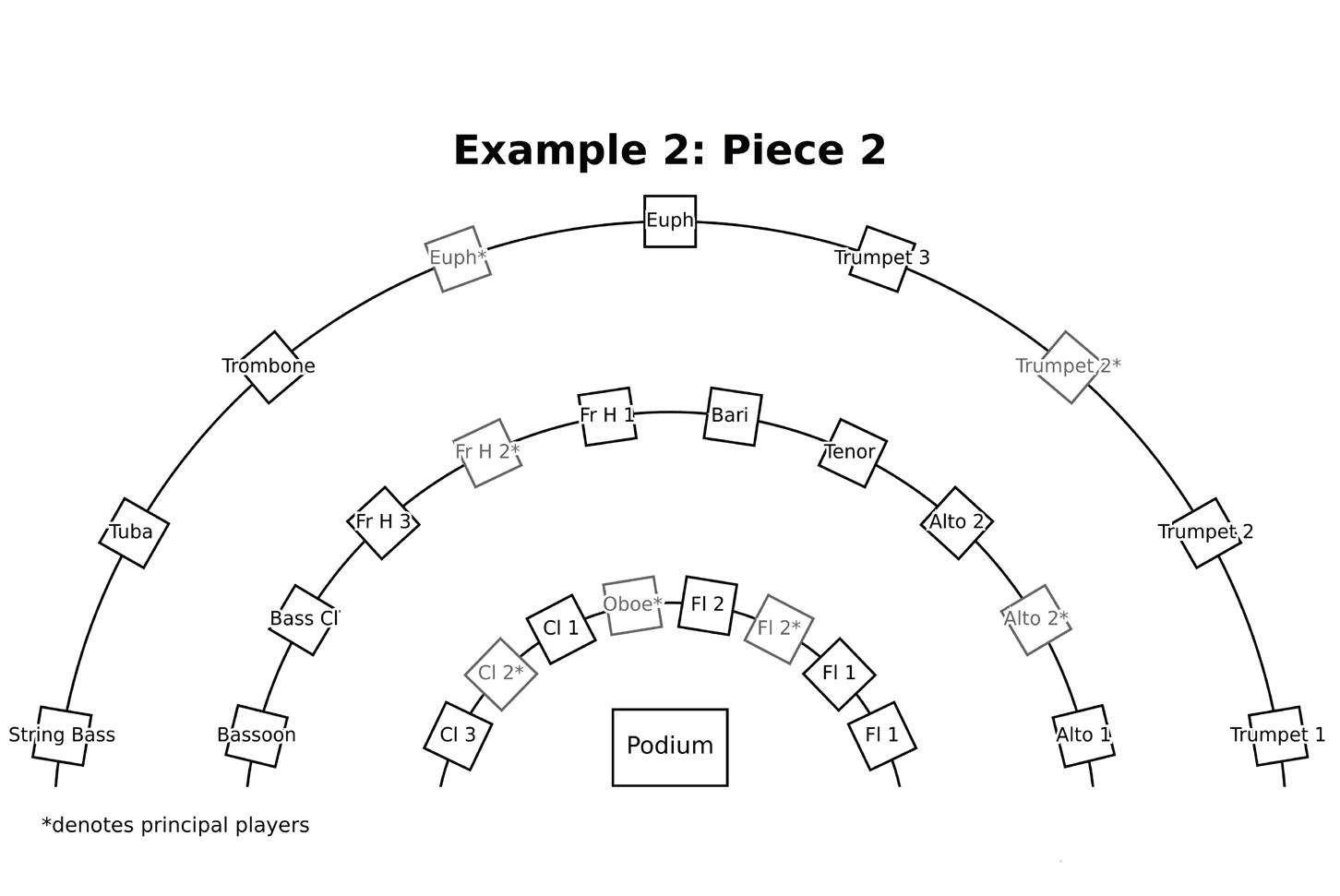

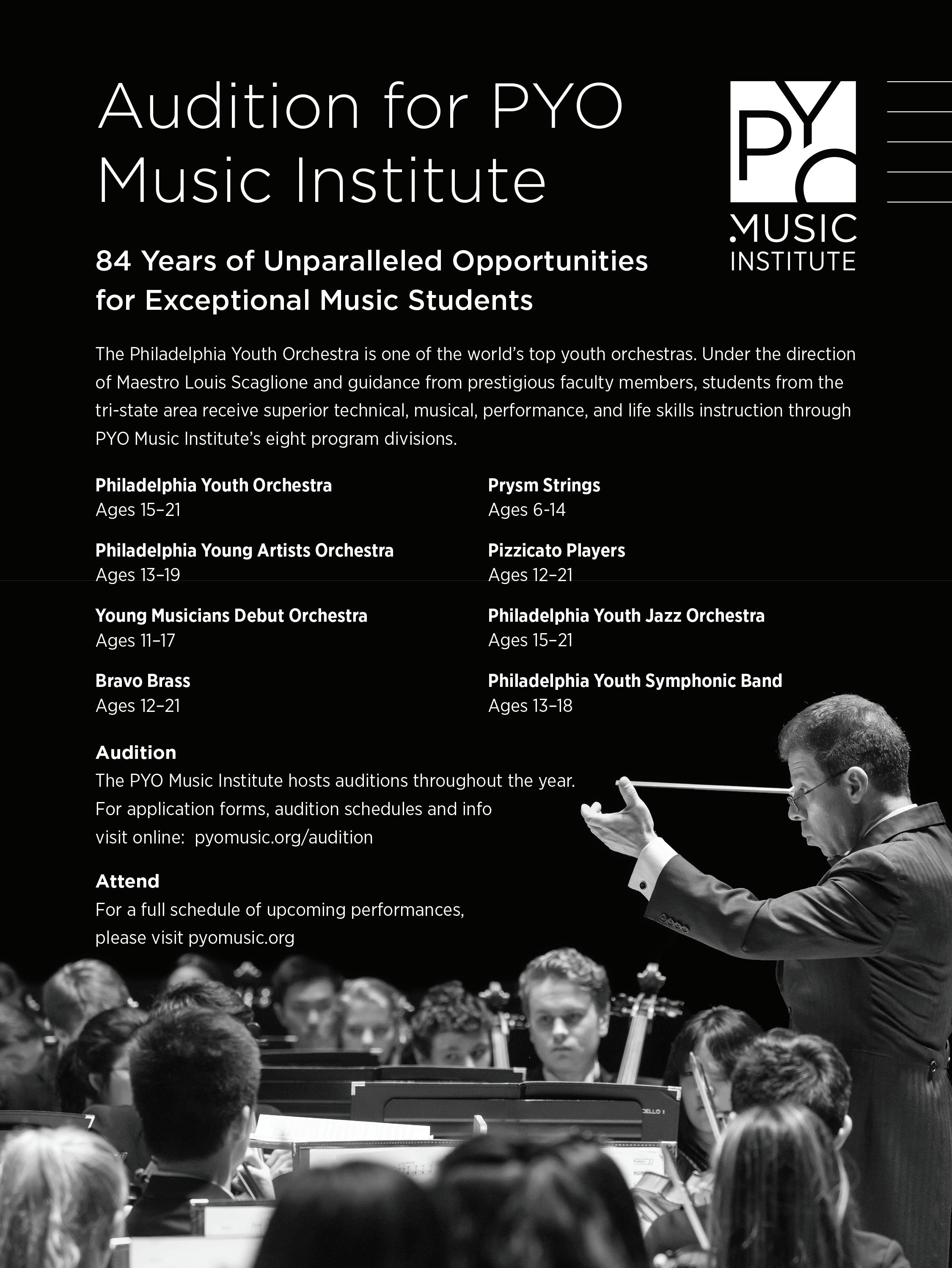
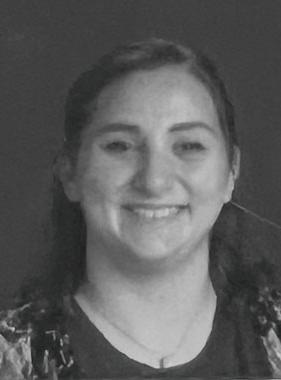
Instrumental specialists have routines and structures in an ensemble setting that provide middle school orchestra or band students a myriad of multisensory learning opportunities. How does this change when we are responsible for engaging a classroom of middle school digital music students? Many educators will hear “digital music” and let the class focus become synonymous with DAWs (Digital Audio Workstations). The challenge my colleagues and I have faced this year is the strategy on how to blend and balance technology with multisensory opportunities that naturally present themselves in ensemble settings. I notice in my own teaching that the completely digital projectbased model serves a handful of students. The majority, however, face barriers in being able to understand the ‘language’ of music and DAWs as well as the attention required for projects regardless of them being an aggregate of smaller steps, individualized checklists, and rubrics.
Here’s how we can adapt that way we engage students in these classes:
From day one of the school year or a new cycle students can get in the habit of responding to and creating their own high order thinking (HOT) questions. I like to use them for focus activities because HOT questions “...encourage students to think beyond literal questions… [they] promote critical thinking skills because these types of questions expect students to apply, analyze, synthesize, and evaluate information instead of simply recalling facts” as stated by Bogdanovich a curriculum specialist at DataWorks (Higher-order Questions, 2014). Some examples of questions I use in the first week:
• How can music elevate film, TV, live productions, video games, and/or daily life (car rides, shops)? Respond in 2-5 sentences with specific examples.
• Why do people listen to music? Explain your answer in 3-5 sentences.
Pictured below is a chart of sentence stems. I particularly find this visual helpful to avoid questions that could easily be answered by Google or “SIRI”:

My day-to-day instruction includes modeling what I expect students to do, so why confine students to sit in front of a computer in the four walls of the music classroom? Getting the students active can improve their focus and improve their mood and behavior throughout the school day.
Students can observe a rehearsal of a school ensemble, and respond or create their own focus questions relating to the elements of music or rehearsal observations. Follow up lessons might look like (1) a fish-bowl discussion using the H.O.T. sentence stems, (2) creating a solo DAW project using or comparing the timbre of instruments, or (3) working in partners to draw in high-detail, label, and describe the timbre of instruments in different musical families.
Listening walks can be another great way to get students moving on a particularly nice day. Similarly, students can do a Soundscapes project about their school:
Engaging middle school digital music students requires a thoughtful blend of technology and multisensory opportunities. The challenge lies in finding opportunities to incorporate multisensory elements into the digital project-based model to elevate music comprehension and meet the learning standards. We can do this by implementing high-order thinking questions and integrating movement-based activities which are overall more engaging, interactive, and conducive to both critical thinking and creativity.
Patricia Bogdanovich. “Higher-order Questions”. DataWorks Educational Research, October 28, 2014, https://dataworksed.com/blog/2014/10/higher-order-questions/ Accessed January 9, 2023.
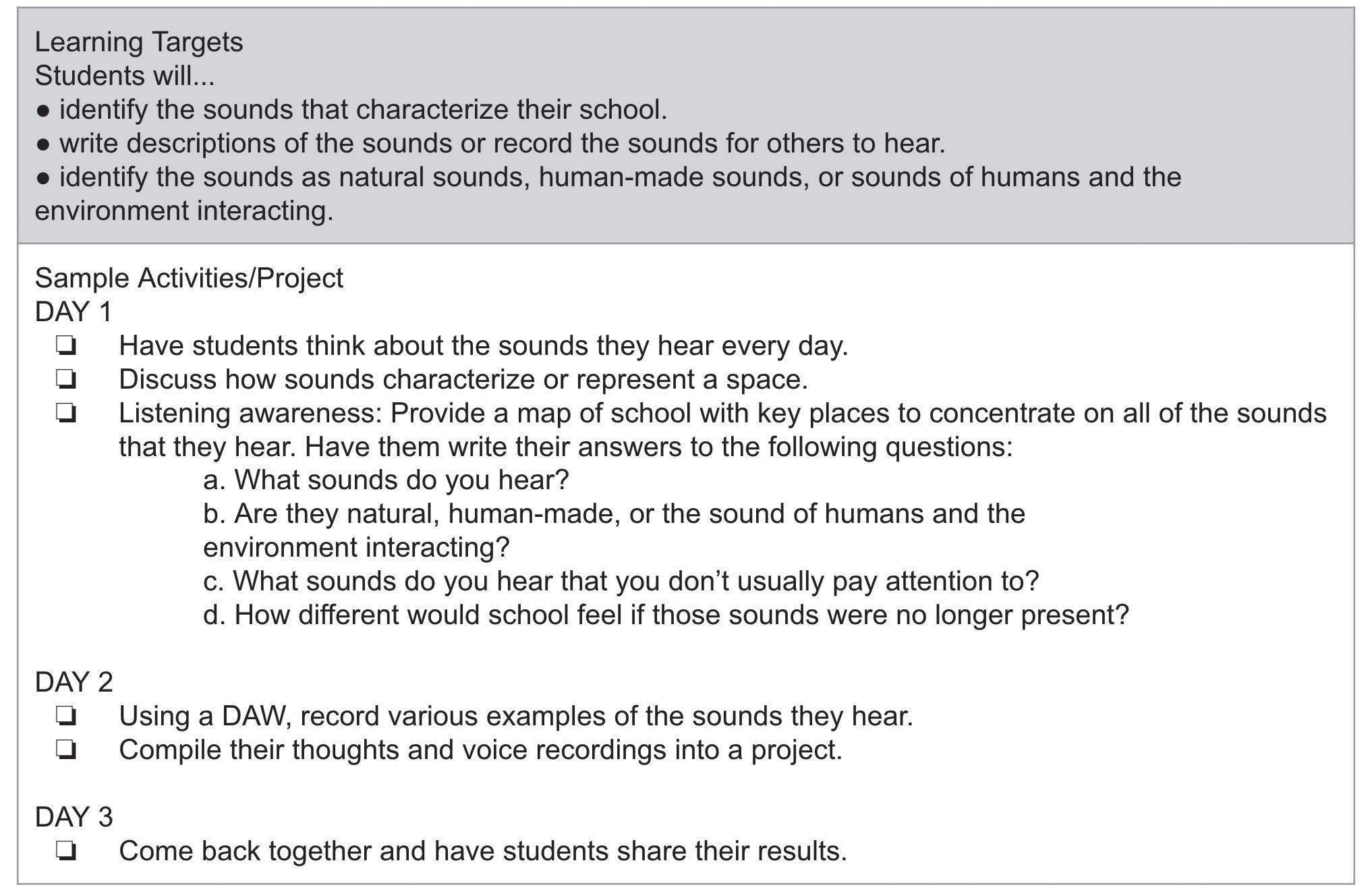
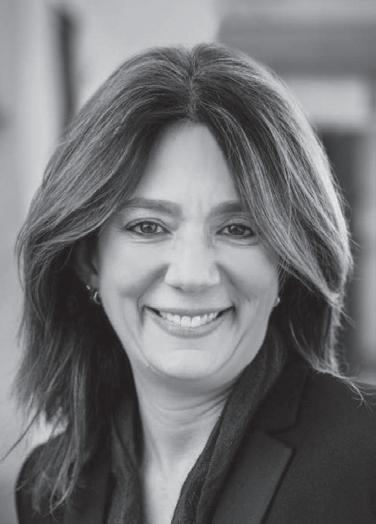
From 2004-2009, I taught high school beginner band, general music, and English at a large school in Queens, New York. And one of my band students, Thermon, knocked on my literature classroom door at 11:15am every day. While in the middle of teaching, say, King Lear or Brave New World to one of my two senior English classes I’d hear: bang, bang, bang.
“Yes, Thermon?”
“Miss…you come downstairs and make music now?”
“No, Thermon. I can’t right now. I’m in the middle of teaching. Aren’t you supposed to be in class right now, too?”
“Well…yeah…but that class is boring. And you know I got special skills—music skills—so can we go downstairs now. Please? Come on. I’ll carry your books. Let’s go!”
“How about I meet you during my break in 25 minutes at the music office and we can play then. OK?”
“OK, Miss. I wanna show you the new stuff I got going on. See you.”
And with that, he’d run down the hallway, towards the stairwell, and disappear until I’d meet him nearly a half-hour later.
Teachers aren’t supposed to have favorite students. I suppose it is like having a favorite child. Not recommended. But, still, I’ll admit it. Thermon was my favorite student. For all sorts of reasons.
Early on in his life, Thermon suffered a massive brain injury. As a 6-year-old foster child, not being properly looked after, he somehow got out of his apartment in Queens and ran across the road towards the near-by bodega. A car hit him. The surgery left him, not only with a large scar that ran up the back of his head, but also cognitively challenged, particularly with language. According to his IEP, he did not possess the ability to properly learn to read and write. Yet, in band class he learned to make and read music. And well. He was a bundle of positive energy, a jovial spirit, who loved telling jokes and silly stories, despite some considerably harsh life circumstances.
His self-contained special education teacher met me most mornings. As I greeted my early morning literature class in the hallway, she’d waltz over to me and let me in on new Thermon shenanigans. She’d often leave the conversation with: “I don’t know what it is about Thermon and music. But since he found his way into band, he’s
been so happy.”
I don’t tell this story to showcase my pride as a teacher. Nor do I think I was an extraordinary music educator. I’m not the right person to assess that. You’d have to ask the students themselves. Instead, I mention this story because while teaching in Queens, I realized the most important disposition, habit, skill, and action needed to teach: Care.1 Once I realized this, I began researching and writing about this important ethical concept (e.g. Silverman, 2009, 2012). However, I didn’t come to this conclusion on my own. Fortunately, I had an amazing model, my primary school music teacher: Miss Lounsberry (Cherry Avenue Elementary School, Sayville, NY).
After moving away from the school district as a ninth grader, she and I lost touch. However, in 1996 upon entering graduate work in flute performance, on a whim, I sent Miss Lounsberry a note; to check in, let her know what I was up to, and tell her how important she was to me. I wanted to make sure she knew that I wouldn’t have found my way to music were it not for her. Looking back on my early childhood days, without a doubt, she helped me find myself. How?
Her miraculous classroom lived and breathed of magnificent colors, artwork and puppets, and musical instruments from all over the world; it was a place of self-discovery and wonder. I recall learning and singing (and sometimes dancing/moving) so many songs from across continents and genres: folk tunes from Eastern Europe, Japan, and Mexico; songs celebrating nature for Earth Day; Gilbert and Sullivan’s “I am the very model of a modern Major-General” from the Pirates of Penzance. I always felt at home and inspired there. In 2nd grade, Miss Lounsberry sensed my musicality and need for “more”—more music, more care—so she invited me to her house every Saturday for two years for free lessons. We sang, played recorder, and improvised; I composed and she helped me notate things so others could decipher my musical ideas. She taught me how to bake chocolate-chip cookies and make macrame potholders. She pushed me, inspired me, and celebrated life and music with me. For school concerts, she invited me to play on piano the pieces I wrote; I sang in every chorus she conducted; I played violin in the school orchestra and flute in the school band. It was the start of the rest of my life.
Needless to say she was happy to hear the news that I continued to make music. Most importantly, she expressed sincere gratitude to receive my letter.
After two years of back-and-forth—yes, handwritten snail mail— we were officially pen pals. We exchanged letters at least once per month. I’d let her know about my New York City concerts (especially the ones that seemed like a big deal to me); she’d tell me all about her elementary school students, her baking—she loved to bake cakes
and cookies—and her arts-and-crafts and photography—she was a wonderful photographer; she sent me handmade calendars each year, every page adorned with her decorations and stunning photos taken from her nature walks.
At one local concert in a small church on the east end of Long Island, I looked out in the audience and surprisingly saw her. All those years later—20 years later—and she was there. Afterwards, she wrote me about this concert in a card she made that held a photograph of tulips she took with her brand-new camera: “When I saw your name in the down-east paper, I thought, ‘I’ll go and show Marissa that I still care. I’m just afraid to drive into NYC. And that’s the only reason I never attended anything sooner.”
Long story short—likely too late for that—we continued to write to one another for the next 20 years. I have hundreds of letters from her; and because my handwriting just got sloppier, I stopped writing by hand and started typing. Luckily, I kept the ones I wrote to her on my computer. I re-read our letters to one another often. There, she gave me teaching advice. She explained how important it was to grow and be better each and every day. Because of this, after over a decade into her career, she took a year off to study at the Kodály Institute in Kecskemét, Hungary. When I asked “why,” she explained that all she learned through her studies served her well up until a certain point; she felt she needed “more” to do better by her students. She explained that every student needed something different; it was up to her to figure out what that might be, what means might be necessary to meet the distinct needs of each and every student. In an early career (naïve) response, I said that my job, in some ways, seemed less challenging than hers. I noted that I could directly ask my high school students questions and, more often than not, they’d explain to me what they needed from me. She responded: “Teaching is never an easy job. Regardless of the age you teach, you need to listen. And listening is a skill. The ways students relay their needs might be through words or some other means of communication. If you can’t figure it out right away, listen more. Listen with more heart.”
In addition to teaching advice, for which there was a ton, she also gave me life advice. At the end of every card or letter, she’d write something like: “I think of you often and wish you a lovely Spring. Go smell a tulip.” During colder months: “I think of you often and wish you a lovely Winter. Go build a snowman.” And always, regardless of the season, she’d remind me about creating a life filled with joy and hope: “I’m now learning at my old age how the little things—like baking cookies, picking wild flowers, taking a walk on the seashore— make life that much richer.”
In 2016, when at the International Society for Music Education Conference in Glasgow, Scotland, I got an email from my elementary school woodwind teacher, Miss Parker, who wrote: “Miss Lounsberry used to read me your letters. She passed away. I was worried you might not have heard.”
Despite her being gone and missing her presence, I still write to her in my head. So, here’s my most recent note to her:
Dear Miss Lounsberry: I’m writing something for preservice and inservice music teachers in New Jersey. What’s the one piece of advice you’d want me to give them as they make their way forward in the music education world?
I know what she’s write me back. She’d say: “Tell them to care.” So, what does “caring” mean?
Researchers continue to grapple with this question, especially due to varying worldwide injustices and inequities such as war, hunger, and environmental disasters. Indeed in some ways, caring and social justice have much in common. As philosopher Virginia Held (2006) explains, care and justice involve associated virtues, personality traits, dispositions, and actions. Still, caring and social justice maintain “different priorities” (p. 41). Common virtues, traits, dispositions, and actions between care and social justice include (but are not limited to): attentiveness, compassion, competence, concern, connection, empathy, responsiveness, self-other responsibility, support, and trust. Held adds, however, that care is much more fundamental to humanity than justice. There can be care without justice, but not the reverse, “for without care no child would survive and there would be no persons to respect” (p. 17). Music teachers care when they teach with such virtues, traits, dispositions, and (musical and non-musical) actions.
Miss Lounsberry didn’t just care about me. She cared about every student. She let all of us know that beauty was possible; that people’s hearts are born good; and that openness and humility are the ways forward. I used to think I was Miss Lounsberry’s favorite student. But unlike me who loved Thermon most, she loved all students. In every encounter, she cared for and loved each student most.
I hope that you become (or are) for someone the kind of teacher Miss Lounsberry was for me.
Held, V. (2006). The ethics of care: Personal, political, and global Oxford University Press.
Hendricks, K. S. (Ed.). (2023). The Oxford handbook of care in music education. Oxford University Press.
Hendricks, K. S. (2018). Compassionate music teaching: A framework for motivation and engagement in the 21st century. Rowman & Littlefield.
Silverman, M. (2023). Caring for caring about music education. In K. S. Hendricks (Ed.), The Oxford handbook of care and music education. Oxford University Press.
Silverman, M. (2022). Care, concern, compassion in/for music education. In F. Abrahams (Ed.), A music pedagogy for our time. GIA Publications.
Silverman, M. (2012). Virtue ethics, care ethics, and “the good life of teaching.” Action, Criticism, and Theory, 11(2), 96–122.
Silverman, M. (2009). Sites of social justice: Community music in New York City. Research Studies in Music Education, 31(2), 178-192.
1 For research literature on relationships between music, music teaching, and care, e.g., Hendricks (2018, 2023) and Silverman (2009, 2012, 2022, 2023).
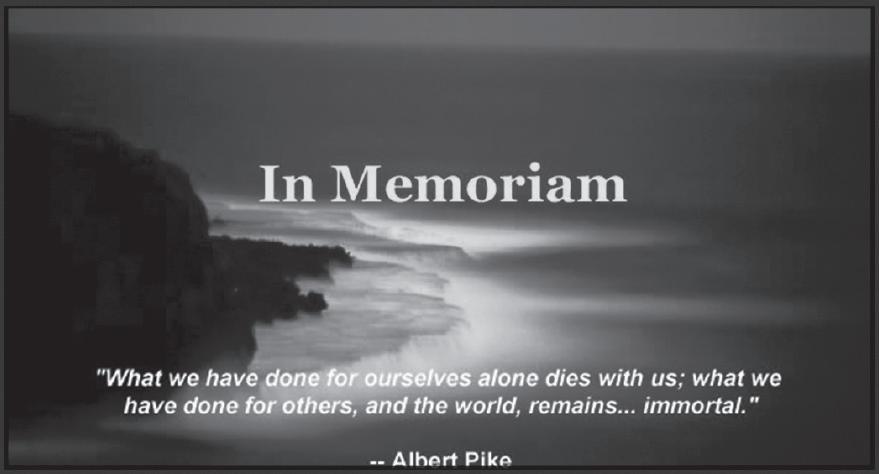
This column salutes the lives and careers of recently departed colleagues. It is the way NJMEA and NJRMEA can express appreciation for the work that they have done and the lives that they have touched. We mourn their passing and salute their contributions, which are the basis for music education in the state of New Jersey.
Esther M. Bentley entered her eternal home in Heaven on May 18, 2023. She was born on September 13, 1928, the daughter of Aubrey and Sara Michener. Her beloved husband of 69+ years, William E. ("Bill") Bentley, Jr., preceded her in death.
Although they lived in multiple states while raising their five children, the family eventually settled in central New Jersey. They lived in Toms River for over 30 years, with Esther spending 20 of those years as an amazing elementary school music teacher. After retirement, Bill and Esther bought a home in North Port, and spent a number of years as "snow birds," splitting time between Florida and New Jersey. They eventually moved to North Port full-time.
Esther was mother to five children: Sara B. Harris (deceased) and husband Wendall; William E. Bentley, III (Claire); Rebecca Novak (Kent); Joyce Bentley Haller (husband Robert C. Haller, deceased); and Grace Bentley Goble (William). She was a beloved "Grammie" of 12 and great-grandmother of 18.
She loved to sing hymns and especially enjoyed playing piano. She grew up in Claymont Delaware and attended Temple University where she received a degree in Music Education.
Joseph Elwood Essinger, born on October 25, 1930 in Camden, NJ, passed away peacefully surrounded by family at Treasure Coast Hospice House in Stuart, FL on March 22, 2023.
He is predeceased by his parents, Albert and Evelyn Essinger. Joe is survived by his faithful and loving wife of almost 70 years Jane, his three children Eileen, Andrew,
and Steven, and seven grandchildren.
He attended Temple University and earned a Bachelor's Degree in Music Education; Rutgers University earning a Master's Degree in School Administration. Joe began his career as a music teacher in Camden School District. He taught music, was Band Director, and then Assistant Principal at Haddon Township High School. Joe opened the new Southern Regional Middle School as Principal and moved to be Principal of the Southern Regional High School until his retirement in 1988. Joe retired to Florida as a full time resident in 1995.
Joe enjoyed boating, fishing, traveling, ringing bells in the church choir, volunteering, and playing vibes in the Melchords band for weddings and private parties. He was an active member of the Masons for over 50 years, as well as a Past Master of his Lodge. Joe was also involved in his community's activities.
Martha Jean Metzger, 93, of Spring Township, died March 6, 2023 in Amity Place, Amity Township. She was married July 11, 1953 to William Wesley Metzger, who died April 14, 2014. Born in Danville, Montour County, PA on December 13, 1929, she was a daughter of the late Charles R. and Mary Dorcas (Rhoades) Hill. Jean was a graduate of Danville High School and West Chester University. She was a music teacher her entire life; teaching private lessons from her home for over 20 years as well as a music teacher with Krebs Middle School, Newport Delaware, and 22 years with West Windsor Plainsboro Public School System, New Jersey, before retiring in 1994. Jean played with the Hartford Symphony, Hartford, CT. She also enjoyed needlepoint and summers in Ocean City, New Jersey. Jean is survived by two daughters: Marilyn, wife of Jack Ribeiro of Spring Township, and Joan Stark, of Newtown. Other survivors include 5 grandchil-
dren: Nicholas Ribeiro, husband of Courtney (Kelley) of Spring Township; Jaclyn (Ribeiro), wife of Scott Miller of Ponte Vedra, Florida; Lindsey Jean (Ribeiro), wife of Greg Soufleris of Orlando, Florida; Lisa Stark of St. Louis, Missouri; David Stark of Denver, Colorado and eight great grandchildren: Tatum Kelley Ribeiro; Taylor Jean Soufleris; Jack Adam Soufleris; Myla Grace Ribeiro; James Joseph Miller; Henry William Miller; Caroline Grace Soufleris; and Harper Nicole Ribeiro. She was predeceased by her sister, Nancy McFadden.
Lavinia T. Trimmer
Music teacher, church organist, active in the Califon community Lavinia T. Trimmer, age 93, of Califon, NJ, passed away on Wednesday, May 17, 2023 at her son's home in South Amboy, NJ.
She was born on November 17, 1929 in Schenectady, NY. She was a longtime resident of Califon, NJ before moving in with her son in 2020. She was the daughter of the late Charles and Zenesta Oergel. Her beloved husband, Sidney "Coss" Trimmer, passed away in 1981.
She was a graduate of Stoneham High School in Stoneham, MA. As an adult, she pursued her college education at Centenary University in Hackettstown, NJ, and College of Saint Elizabeth in Morristown, NJ.
Music was one of her joys and passions as she was a music teacher at various elementary schools in NJ and enjoyed giving private piano lessons. One of her former piano students once remarked that taking piano lessons from Mrs. Trimmer was like a rite of passage growing up in Califon.
In addition to teaching music she was also the church organist for several churches including Lower Valley Presbyterian Church, a Presbyterian church in West Orange and Sandy Ridge Community Baptist Church in Stockton, NJ. She was also known to direct Hand Bell Choir for Christmas Services.
She was also a member of the Order of the Eastern Star in High Bridge, NJ.
Lavinia was very active in her community as she served on the School Board, Board of Health, and Board of Elections, in Califon as well as being a member of the Califon Historical Society.
In addition to music, she was also passionate about needlework arts including lace making, cross-stitch and embroidery. It was not uncommon for family members to receive a hand-knitted sweater for Christmas or a quilt
as a wedding gift. Lavinia was active in 'Lost Art Lacers' an organization of lacemakers, FCE - Friends of Counted Embroidery, EGA - Embroiders' Guild of America, as well as Visions which is a stitching group. She taught stitching at many of these groups as well as demonstrated bobbin lace at the Scandinavian Festival in Budd Lake.
Lavinia lived a full life. Some of her travels included a trip to Ireland, a trip to England which included a short day trip to visit Cosely, UK, which is where her great, great grandparents were married, and trips to visit friends in Germany and Italy. She also enjoyed weekly visits with her friends and especially enjoyed a huge celebration of her 80th birthday with all who loved her. She will be dearly missed by all who knew her.
Survivors include three sons, John Trimmer of Budd Lake, NJ, Charles Trimmer of South Amboy, NJ and Eric Trimmer of Allentown, PA; One brother, Donald Oergel and his wife Nancy of Phoenix, AZ and their adult children and families, Darcy, Dawn, Michael and Cheryl. Two adoptive grandchildren, Robert and Samantha Roome of Budd Lake, NJ; Cousins, Frank Oergel and his wife Linda of Horsham, PA, Cathy Riley and her husband Joseph of Levittown, PA.


North Jersey School Music Association
www.njsma.com
Greetings to all of our colleagues! This new year has been filled with some great musical events and performances throughout our region. Our high school ensembles along with our intermediate orchestra performed great programs to showcase the fine young musicians in our region. None of these events are possible without the hard work of our members. A huge thank you goes out to our division chairs, site hosts, managers, accompanists and conductors. Here are the highlights of these concerts.
BAND band[at]njsma.org
Division Co - Chairs - Lewis Kelly, Michelle Christianson and Chris Zwarych
High School Region Band - Audition Chair - Michelle Christianson - Hosted at Parsippany Hills HS by Michael Iapicca and Michelle Christianson
High School Wind Ensemble
Conductor - Dr. Eric Laprade - Director of Bands at The College of New Jersey
Managers - Josh Jenkins - Ramsey HS, Amy WilcoxNorthern Valley HS at Old Tappan
Rehearsal conductor - Mindy Scheierman, retired
High School Symphonic Band
Conductor - Dr. Andrea Brown - Associate Director of Bands at the University of Maryland
Managers -Jeffrey Bittner - Mahwah HS, Mick GibbonsWest Morris Mendham HS
Rehearsal conductor - Jeffrey Bittner - Mahwah HS
CHORUS chorus[at]njsma.org
Division Co- Chairs - Deana Larsen and Leo Weismantel
High School Region Chorus - Audition Chair - Matthew Swiss
Hosted at Clifton HS by Leo Weismantel, Mount Olive HS by Matthew Vanzini & Morris Knolls HS by Kristen Markowski
High School Mixed Chorus
Conductor - Dr. Christopher Thomas - Director of Choral Activities at Rowan University
Accompanist - James Lubrano
High School Treble Chorus
Conductor - Dan Malloy - Newton HS
Accompanist - Andrew Macirowski
Managers: Patrice Kane Kittatiny Regional HS and Rebecca Polynice Paramus HS
ORCHESTRA orchestra[at]njsma.org
Division Co-Chairs - Justin Louie and Paulina Edel
High School and Intermediate Orchestra - Audition Chairs: Cathay Clark and Laura Abbey - Hosted at Morris Knolls HS by Brett Izsa
Intermediate Orchestra
Conductor - Caitlin Shroyer - West Essex HS
Managers - Darby MacAdams - Central MS and Mike Holak - Leonia HS
High School Symphonic Orchestra
Conductor - Jiannan Cheng - Director of Orchestras at Rowan University
Manager - Adam Austerlitz - Brooklawn MS
ELEMENTARY MUSIC DIVISION elementary[at]njsma.org
Division Co-Chairs - Lisa Wichman and Karen Andruska
Registration is now open for the "It's Elementary, My Dear" workshop, co-sponsored with the New Jersey Youth Chorus. Elementary/choral music educators are invited to a half-day conference (Saturday, April 6, 9:30am-12:30pm) with rotating workshops and a choral reading session with a demonstration choir.
The 6th Annual Choral Celebration for 3rd-7th grade treble choral ensembles will take place on Wednesday, May 29. Guest clinicians are Trish Joyce and Dr. John Wilson. Information and registration forms for both events can be found on the njsma. org website.
On Saturday, February 10th we held our intermediate band and chorus auditions at Wayne Hills HS. We would like to thank Matthew Paterno and Annie Pascale for a smooth day! We look forward to working together in the future.
It was great to catch up with some many members at the NJMEA conference in Atlantic City. If you attended, I hope that you took advantage of the great opportunities that were scheduled. If you were not able to attend the conference or our region meeting on Friday afternoon, please feel free to reach out to me with any questions.
We still have many events planned through the remainder of the school year including the Intermediate Band Concert, High School Band Festivals, Intermediate Chorus Concert, It’s Elementary My Dear PD, Intermediate & High School Orchestra Festival, Intermediate Concert Band Festival, Elementary Honors Orchestra Festival, 5th & 6th Grade Honors Band Festival, Guitar Festival, Elementary Choral Celebration and our Membership PD Day.
Info for all of the above mentioned events can be found on our website calendar (https://njsma.org/calendar/). Please also visit the website (https://njsma.org/) for other region related information and contact info for all executive board members. If you are interested in volunteering to help in any capacity, please let us know. We would love to hear from you.
I hope everyone has a successful and enjoyable end to the school year. Please don’t hesitate to reach out if there is anything I can help you with.
Anthony Lanzerotti NJSMA President president[at]njsma.orgI hope this message finds everyone in good spirits with spring break approaching. I wanted to take a second to thank each of you that made it out to the CJMEA regional meeting at the February conference. It was wonderful to meet you all and get a chance to talk about how to better support you in Region II. As we mentioned in the meeting, if anyone is interested in helping out please feel free to reach out to me at president.cjmea[at] gmail.com. The thing we most desperately need are site hosts for rehearsals and concerts.
CJMEA has completed all of its high school regional performances for the year and is well underway into the intermediate performances. I wanted to take a moment to thank the CJMEA Board Members that make opportunities like this possible. The division ensemble chairs of CJMEA: Clay Beyert (HS Band), Arvin Gopal (HS Orchestra), Lindsey Reinhard (HS Choir), Helen Kernizan (MS Choir), Grace Lee (MS Orchestra), Sandy Olson & Ashlen Udell (MS Band), Yale Snyder (HS & MS Percussion). Thank you to all of the managers who dedicate hours making sure every detail is in order. To our Webmaster, Trevor Sindorf, for maintaining our ability to reach out to all of our members throughout this process.
Regional ensembles give students the opportunity to meet like minded peers and work with some fantastic directors in the field. The memories they walk away with easily become highlights of their musical careers, and none of that would be possible without the amazing conductors that work with the musicians of Region II. Thank you Lalo Davila (HS Percussion), Simon Lipskar (HS Orchestra), Janet Song Kim (HS Symphonic Band), Travis Cross (HS Wind Ensemble), Julia Baumanis (HS Honors Symphonic Band), Raul Dominguez (HS Mixed Choir), Jessica Pameroy (HS Treble Choir), Chaequan Anderson (Int Mixed Choir), Laura Harmon (Int Treble Choir), Nicolas Mossa (Int Symphonic Band), and William Owens (Int Wind Ensemble) for the amazing music.
In the next months, we will finish out our regional concert series and begin working on our honors concerts. These events are wonderful opportunities for students who may not have the time to dedicate to all of the rehearsals for a regional ensemble to get a regional experience. CJMEA is also offering professional development opportunities in March and June. The March 16th session will run from 9am - 1pm in person at North Brunswick Township Middle School. More information to come on this event and the June PD Sessions. As always, you can stay up to date on news and register for these opportunities on our website (cjmea.org). Hope to see you at one of these events!
Have a wonderful second semester, enjoy your spring breaks, and finish this year strong!
Brian Williams CJMEA President president.cjmea[at]gmail.comThe South Jersey Choral Directors Association had their annual concerts on January 27th and 28th at Washington Township High School. Both choirs gave excellent performances and we were so proud of our student's and directors for doing such a remarkable job for our region and community.
Laurie Lausi from Cherry Hill East High School led the senior high chorus and Elisa Contrevo from Glassboro High School led the junior high chorus. We would like to thank everyone who contributed to the success of this year’s festival, from audition day to performance day; the choral directors who sponsor the singers, our managers Lauren Allen and Jen Weir, the board of directors, and especially our festival coordinator, Amy Melson. Everyone went above and beyond to give the singers of Region III an exceptional rehearsal process and beautiful culminating performances.
SJCDA also recently had our day long Elementary Festival, bringing together hundreds of 4th through 6th graders for a day for learning, community, and fun that ended in a stellar performance, under the baton of Sarah Mickle from Pitman High School. Special thanks to the teachers who sponsor students and teach the music to ensure this day happens! We are indebted to our two managers Matt Guerrasio and Theresa Hengeli for their flawless leadership.
We would like to additionally thank our gracious hosts who open their spaces for us to sing in. Thanks to Scott Garvin & Chelsea Franchi from the Clearview School District, Brendan Moore from Lenape High School, Dr. Chris Thomas & Jennie Quinn from Rowan University, and Amy Melson, Casey Corigliano, Jim Weiner and Kevin Lindstedt from Washington Twp. High School.
Directors are reminded that our Spring Breakfast and General Membership Meeting will be held on April 26, 2024, from 9:00 AM to 12:00 PM. Workshop speaker with Dr. Jason Vodicka and breakfast will be held at Scotland Run Golf Club in Williamstown, NJ. Directors will receive professional development hours as well as an opportunity to discuss the continued improvement of the organization and its events. Information will be available on our website at www.sjcda.com
Cristin Introcaso SJCDA Presidentsjchoraldirectors[at]gmail.com
www.sjboda.org
The past few months have been very exciting and rewarding for the members of SJBODA. On January 7th, our Senior High Orchestra and Junior High String Ensemble performed at Rowan University, and the following week our Senior High Wind Ensemble and Senior High Symphonic Band performed at the same venue. Their music was beautiful and the result of the many excellent music teachers and programs throughout our region. The conductors for these concerts were Kenneth Bean (Symphony in C), Hester Hasheian (Glassboro Public Schools), Dr. Patricia Cornett (Temple University), and Jim Mark (Cherry Hill West HS, retired). Carrington Thompson (Eastern Regional HS) was our strings coordinator and Amanda Lakits Porco (Hamilton Township Schools) was our bands coordinator. The manager for the High School Orchestra was Cheryl Van Buren (Haddon Township Public Schools, retired) and Samantha Sara (Miller ES) managed the String Ensemble. The Wind Ensemble was managed by D. Michael Lynch (Cherokee HS). Ryan Sagedy (Cherry Hill West HS) and Brian Shugarts (Galloway Township MS) were the managers for the Symphonic Band. Jiannan Cheng and Megan Cooney were our hosts for these concerts.
Congratulations to Zachary Holzmann (Delran HS) who received the 2024 SJBODA Cheryl Rothkopf Memorial Scholarship for orchestra and Jack Crawford (Washington Township HS) who was the recipient of the band scholarship. We wish these students and all of our seniors continued success in their future endeavors.
Our 16th Annual Chamber Ensemble Concert took place on Wednesday, February 7th, at Penns Grove HS. Jon Porco (Deptford Township MS) was our Chamber Ensemble Coordinator and Ken Rafter was our concert host. The ensemble coaches were Brass: Ken Rafter (Penns Grove HS), Percussion: Garrett Davis (Egg Harbor Township School District), Sax Quartet: Andrew Pretelt (Cherry Hill School District), Woodwind Quintet: Sam Brooks (Glen Landing MS), Clarinet Choir: Kelly Madensky (Toms River School District), Flute Quartet: Liva Savaiinaea (Private Teacher),
and Tuba/Euphonium Quartet: Patrick O’Keefe (Absegami HS).
Once again, our Junior High Band auditions, held at Southern Regional Middle School, were a successful event. The efforts of Jon Porco (Deptford Township MS) and Joe Jacobs (Ventnor MS, retired), our Junior High Auditions Chairs, were greatly appreciated by teachers and students. With the assistance of Phil Senseney (Southern Regional School District, retired), Jeff Moore (Palmyra HS), and Sue Mark (Rosa International MS) they provided a positive experience for all involved. These auditions were hosted by Andrew Wright, Jennifer Hodgson, and the Southern Regional TRI-M Music Honor Society Chapter. Nancy Robinson (Linwood Public Schools, retired) is doing a wonderful job in assisting the conductors and students as the Junior High Band Coordinator. The conductors for the 46th Annual Junior High Band Concert are Donna Scharfetter (Ocean City HS, retired) and Christopher Carl (Lumberton MS). Anita Gosevska (Upper Township MS) and Robin Sodin (Pleasantville MS) are the managers. The rehearsals were hosted by Derek Rohaly at Mainland Regional High School and the concert will take place on March 3rd at Fernwood Avenue MS. Marc Spatz and Dawn Donchey will host this event.
The 30th Annual SJBODA Concert Band Festival will take place on Tuesday, March 12th and Wednesday, March 13th, at Rowan University. Our festival coordinator is Mike Armstrong (Deptford Township HS). Megan Cooney (Rowan University) will host this event. The adjudicators were not confirmed at the deadline for this article.
The 7th annual Elementary String Festival will take place on Saturday, April 20th, at Fernwood Ave. MS. Kate Wyatt will be our host and Christine Macaulay (Clara Barton ES) will be our coordinator. Samantha Sara (Miller ES) and Jennifer Gaffney (Haddon Township Public Schools) will be our conductors. Our managers are Kate Wyatt (Egg Harbor Township Public Schools) and Abigail Marmelstein (Haddon Township Public Schools). Additional information can be found on our website.
The 30th Annual Elementary Honors Band Festival will take place on Saturday May 11th, at Absegami HS. Patrick O’Keefe will be our host. LeeAnn Hewitt (Frog Pond ES and Eagleswood ES) will be our coordinator for this event. Our conductors will be Michael Daly (Roland Rogers ES), Jacob Weber (Cherry Hill Public Schools), David Dashefsky (Clayton Public Schools), and Carla Graff (West Deptford MS). The managers will include Tim Trout (Berlin Community School) and Andy Owens (Ann Mullen MS), Tom Kershaw (West Deptford HS), and Kaitlin Weber (ER Johnstone Elementary School) .
The SJBODA Spring Breakfast meeting will take place on Wednesday, May 22nd, at 9:00 AM at Seven Star Diner. Please contact Sue Mark at 609-457-0590, or sjbodapresident[at]gmail. com if you plan to attend. Please continue to check the Web site, maintained by Derek Rohaly (Mainland Regional HS), for the latest SJBODA updates.
Sue Mark SJBODA President sjbodapresident[at]gmail.com
Area of Responsibility
Administrative Matters
Name
Email Address
David Westawski westawski.njmea[at]gmail.com
All-State Coordinator ....................................................... Joseph Cantaffa .................................. jcantaffa[at]rocknrollchorus.com
Association Business William McDevitt wmcdevittnjmea[at]gmail.com
Band Performance Chair ................................................... Patrick O'Keefe ............................................ patrickaokeefe[at]gmail.com
Band Procedures Chair
Tyler Wiernusz twiernusz[at]clearviewregional.edu
Choral Performance Chair Brian Williams williams.brian[at]robbinsville.k12.nj.us
Choral Procedures Chair ...................................................... Ken Bryson............................................. kennethbryson[at]gmail.com
Composition Contest Andrew Lesser andrew.lesser[at]yahoo.com
Diversity/Equity/Inclusion/Access ...................................
Jazz Procedures Chair
Isaiah C. Mason ................................................. deia.njmea[at]gmail.com
Darrell Hendricks dhendricks.njaje[at]gmail.com
Marching Band Festival Chair Nancy Clasen nancyclasen[at]gmail.com
Membership ................................................................... William McDevitt ...................................... wmcdevittnjmea[at]gmail.com
Middle/Junior High Band Festival Nancy Clasen nancyclasen[at]gmail.com
Middle/Junior High Choral Festival ............................ Donna Marie Berchtold ....................................... firesongwed[at]gmail.com
NJMEA Historian ............................................................. Nicholas Santoro ................................................... n31b13[at]gmail.com
NJMEA State Conference Exhibits Chair Nancy Clasen nancyclasen[at]gmail.com
NJMEA State Conference Manager .................................... Marie Malara ....................................................... malara97[at]aol.com
NJMEA/ACDA Honors Choir
Kaitlyn Reiser kreiser[at]spfk12.org
November Convention – NJEA ........................................... Nancy Clasen ............................................... nancyclasen[at]gmail.com
Opera Festival Chair ................................................... Donna Marie Berchtold ....................................... firesongwed[at]gmail.com
Orchestra Performance Chair
Susan Meuse susanmeuse[at]gmail.com
Orchestra Procedures Chair ................................. Craig Stanton & Elisabeth Sato ............................... asoprocedures[at]gmail.com
Research Wayne Mallette mallette.njmea[at]gmail.com
Students with Special Needs............................................
Maureen Butler ................................ maureenbutlermusic[at]gmail.com
Supervisor of Performing Groups .................................... Wayne Mallette .......................................... mallette.njmea[at]gmail.com
Tri-M
Yale Snyder snyder.njmea[at]gmail.com
NJ American Choral Directors Association .......................... John Wilson ................................................... jwilson[at]brrsd.k12.nj.us
Governor’s Award for Arts Education
NJ Association for Jazz Education ...................................
NAfME
NJ Music Administrators Association
Wayne Mallette mallette.njmea[at]gmail.com
Darrell Hendricks ....................................... dhendricks.njaje[at]gmail.com
William McDevitt wmcdevittnjmea[at]gmail.com
Alfred Hadinger alfred_hadinger[at]nplainfield.org
NJ Retired Music Educators Association ............................ Ronald Dolce ....................................................... rdolce561[at]aol.com
Percussive Arts Society
Joe Bergen joe[at]mantrapercussion.org
Executive Director/TEMPO Editor/ TEMPO Express/NJMEA Website
William McDevitt wmcdevittnjmea[at]gmail.com



The nation’s premier professional development provider for musicianeducators UArts is an approved provider of PA Act 48 hours, NY CTLU hours, and professional development for New Jersey and Maryland.
We are now accepting applications for the MM in Music Education degree program for summer 2024 enrollment. Open enrollment starts March 1.

SESSION 1
June 24–28
University of the Arts
SESSION 3
July 15–19
Villanova University
ONLINE
June 17–Aug. 2
SESSION 2
July 8–12
Villanova University
SESSION 4
July 22–26
Villanova University
(Orff course weeks: July 8–12 and July 15–19)




DISNEY
#1

public college
US News & World Report
Regional Universities North
The Department of Music is an accredited institutional member of the National Association of Schools of Music (NASM) as well as a collegiate member of the National Association for Music Education (NAfME)

Programs of Study
B.A. in Music
B.M. in Performance
B.M. in Music Education
Minor in Music
Minor in Music Technology
Minor in Theatre
Academic and Performance scholarships available
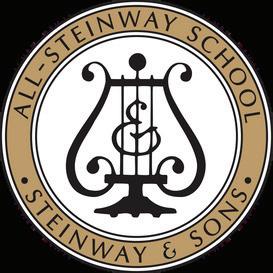
Schedule your audition today! music.tcnj.edu/audition/
2023-2024 audition dates: January 31, February 17, March 2, March 6 and March 20.

Past President
Wayne Mallette

NJSMA, President
Anthony Lanzerotti, Jr Woodrow Wilson MS president[at]njsma.com

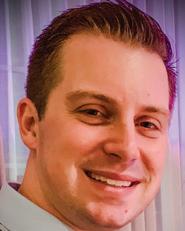




President
David Westawski
West Windsor-Plainsboro High School South westawski.njmea[at]gmail.com
Scotch Palins-Fanwood District mallette.njmea[at]gmail.com

CJMEA, President
Brian Williams Robbinsville HS president.cjmea[at]gmail.com

Executive Director
William McDevitt
Retired wmcdevittnjmea[at]gmail.com
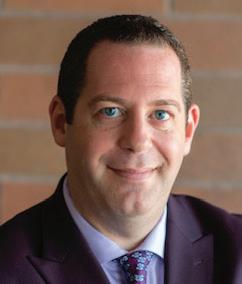
President-Elect
Yale Snyder Monroe Township District snyder.njmea[at]gmail.com
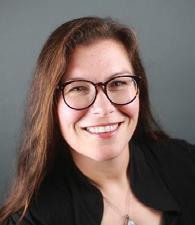
SJCDA, President
Cristin Introcaso Collingswood HS cintrocaso[at]collsk12.org
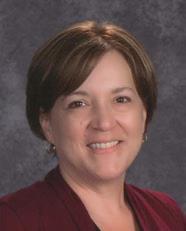
SJBODA, President
Sue Mark
Rosa International MS president[at]sjboda.org
Accessible Music Education
Maureen Butler
Retired maureenbutlermusic[at]gmail.com
Administration/Advocacy
Alfred Hadinger North Plainfield alfred_hadinger[at]nplainfield.org
Band Festivals/NJEA Liaison
Nancy Clasen Lodi Public Schools nancyclasen[at]gmail.com
Band Performance
Patrick O'Keefe Absegami High School patrickaokeefe[at]gmail.com
Choral Festivals
Donna Marie Berchtold Retired firesongwed[at]gmail.com

Choral Performance
Brian Williams
Robbinsville High School NJAllStateChoir[at]gmail.com

Chorus/Orchestra/Jazz
Joseph Cantaffa
Howell High School jcantaffahhs[at]hotmail.com
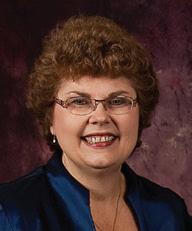
Conferences
Marie Malara Retired malara97[at]aol.com

D.E.I.A
Isaiah C. Mason
Linwood School deia.njmea[at]gmail.com

Emerging Ensembles
Zach Gates
East Brunswick High School zacharygatesmusic[at]gmail.com
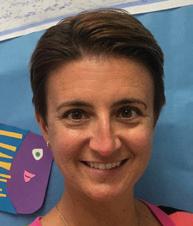
K-12 Ed Tech/Secondary General
Shawna Longo
Westfield Public Schools shawnalongo[at]gmail.com
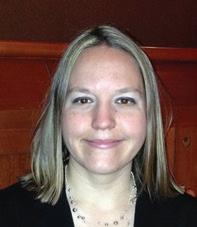
Orchestra Performance/Festivals
Susan Meuse
Hammarskjold Middle School susanmeuse[at]gmail.com

PreK-8 General Music
Amy Burns
Far Hills Country Day School aburns[at]fhcds.org

Research/Collegiate/HigherEd
Marissa Silverman
Montclair State University silvermanm[at]montclair.edu
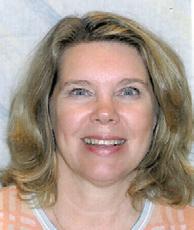
Retired Members/Mentorship
Kathy Spadafino
Retired kspadeb[at]aol.com
Note: Additional fees will apply if metal plates are required. Ads which exceed the specified sizes will be charged at next ad size.
Articles may be submitted to the editor of this magazine by anyone who wishes to write about topics related to music or music education. All articles which are selected for publication will be proof read for content, spelling and grammatical errors. Authors who submit an article to TEMPO Magazine for publication agree to all of the following
1. the editor may edit all articles for content, spelling and grammar.
2. the printing of the article in TEMPO Magazine, the printing date, and placement are at the discretion of the editor.
3. permission is granted to reprint the same article in any National or State Music Education Association magazine on the condition that the author’s name and TEMPO Magazine are to be mentioned in all reprinted articles.
4. no exceptions will be made regarding items 1 through 3 above.
5. the author of the article may submit his/her article to additional magazines for publication.
1924 - 1926 Josephine Duke
1926 - 1930 R.W. Laslett Smith
1930 - Jay W. Fay
1930 - 1931 Wilbert B. Hitchner
1931 - 1933 Thomas Wilson
1933 - 1935 John H. Jaquish
1935 - 1936 Clifford Demarest
1936 - 1938 Mable E. Bray
1938 - 1939
Paul H. Oliver
1939 - 1941 K. Elizabeth Ingles
1941 - 1942
Arthur E. Ward
1942 - 1944 John T. Nicholson
1944 - 1945
1945 - 1947
1947 - 1949
1949 - 1951
1951 - 1953
1953 - 1955
Frances Allan-Allen
Philip Gordon
Violet Johnson
Samuel W. Peck
Janet G. Gleason
Henry Zimmerman
1955 - 1957 Agnes B. Gordown
1957 - 1959 Leroy B. Lenox
1959 - 1961 Elizabeth R. Wood
1961 - 1963
Harold A. Brown
1963 - 1965 E. Brock Griffith
1965 - 1967
Robert C. Heath
1967 - 1969 Edward Brown
1969 - 1971
Rudolph Kreutzer
1971 - 1973 Charles Wertman
1973 - 1975
1975 - 1977
1977 - 1979
Stephen M. Clarke
Herman L. Dash
Buddy S. Ajalat
1979 - 1981 Alyn J. Heim
1981 - 1983
1983 - 1985
1985 - 1987
Robert Marince
Anthony Guerere
Joan Policastro
1987 - 1989 Joseph Mello
1989 - 1991
Dorian Parreott
1991 - 1993 David S. Jones
1993 - 1995 Anthony Guerere
1995 - 1997 Sharon Strack
1997 - 1999 Chic Hansen
1999 - 2001 Joseph Mello
2001 - 2003 Nicholas Santoro
2003 - 2005 Frank Phillips
2005 - 2007
2007 - 2009
Joseph Akinskas
Robert Frampton
2009 - 2011 William McDevitt
2011 - 2013 Keith Hodgson
2013 - 2015 Joseph Jacobs
2015 - 2017 William McDevitt
2017 - 2019 Jeffrey Santoro
2019 - 2021 Patrick O'Keefe
2021 - 2023 Wayne Mallette


Offering undergraduate and graduate programs in performance, composition, music education, music history, music theory, music therapy, music technology, string pedagogy and windband conducting, Boyer students receive extensive performance opportunities as well as regular study with world-class studio faculty, many of whom are drawn from The Philadelphia Orchestra and other prominent regional ensembles.
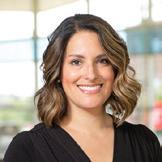
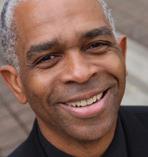


For more information, please contact: (215) 204-6810 or boyer@temple.edu
boyer.temple.edu

